 14/04/2009 16:17 14/04/2009 16:17 |
|
| | | OFFLINE | | Post: 17.130 | Registrato il: 28/08/2005
| Utente Gold | |
|
OREMUS PRO PONTEFICE NOSTRO
The Holy Father requests the prayers of all the faithful so that the Lord may illumine the road for the Church. May the commitment of Pastors and the faithful grow, in support of the delicate and weighty mission of the Successor of the Apostle Peter as 'the guardian of unity' in the Church.
- Vatican Note, Feb. 4, 2009
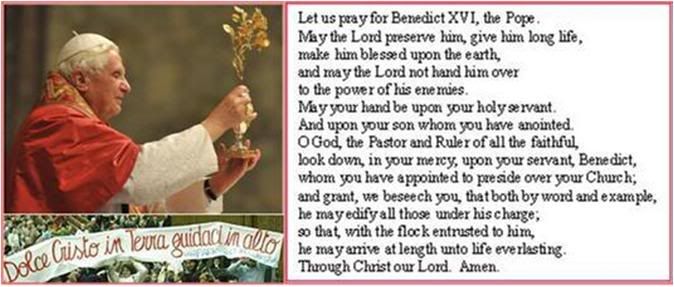

 Sorry to have messed up yesterday - I didn't realize the last post (Luigi Accattoli's article) was double-posted. {This is what happens when one is trying to make up for a lost day at 2 o'clock in the morning!) I have now taken out the repeat, which was in this space, and replaced it with a re-post of the Le Figaro article which, I discovered to my horror, I had incompletely translated. I had lifted it online to a Word document, and I missed translating Page 2 of the document. This is the complete translation.
Sorry to have messed up yesterday - I didn't realize the last post (Luigi Accattoli's article) was double-posted. {This is what happens when one is trying to make up for a lost day at 2 o'clock in the morning!) I have now taken out the repeat, which was in this space, and replaced it with a re-post of the Le Figaro article which, I discovered to my horror, I had incompletely translated. I had lifted it online to a Word document, and I missed translating Page 2 of the document. This is the complete translation.
 For all intents and purposes, we are entering the fifth year of Benedict XVI's Pontificate, Deo gratias, even though April 19 is still a few days away.
For all intents and purposes, we are entering the fifth year of Benedict XVI's Pontificate, Deo gratias, even though April 19 is still a few days away.
While the Italian papers observed Angel's Monday today by not publishing, Le Figaro today (Monday, 4/13/09) has a 'major' article on Benedict's Pontificate - even if it continues to perpetrate the media's own myths. It is unfortunate that what passes for analysis is little more than a superficial recapitulation of exhausted but ingrained biases, with no attempt at analytical distance.
BENEDICT XVI'S VIA CRUCIS
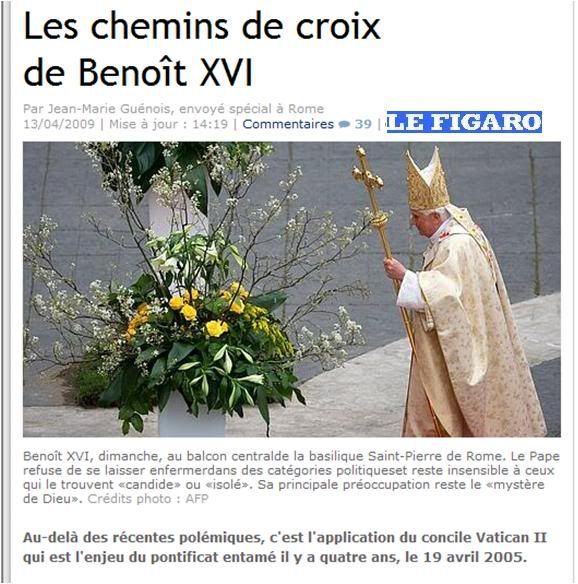
[Caption]: Benedict XVI, Sunday, on the central balcony of St. Peter's Basilica in Rome. [OObviously not!] The Pope rufuses to be enclosed within political categories and remains impervious to those who find him 'naive' or 'isolated'. His principal concern remains 'the mistery of God'. [AFP photo]
Beyond recent controversy, it is the application of Vatican II which is the principal stake of the Pontificate which began four years ago, on April 19, 2005.
Last Friday night, Benedict XVI carried the Cross. The Via Crucis at the Colosseum had a very special significance for him. On the eve of his 82nd birthday, on April 16, he had just undergone the most violent tempest in the four years of his Pontificate, begun on April 19, 2005.
The succession in this first three months of the year, of three 'cases' - lifting the excommunication of four Lefebvrian bishops of which one is a Holocaust denier; the issue over the 9-year-old Brazilian girl whose twin pregnancy resulting from rape by her stepfather was aborted [an 'issue' that seemed to have 'caught on' only in France outside of Brazil]; and the Pope's statements on condoms and AIDS in Africa - all brought unprecedented trouble within the Church as outside it. [An exaggeration that reflects the media-generated inflation of these situations!] - a sort of crisis in confidence which has led some to question the credibility of Benedict XVI. [Typical MSM set-up to convey a fallacious impression as being more 'widespread' than within the proponent's biased milieu!]
The three cases may have nothing to do with such a crisis but together they do provoke the same reflex accusations. [Well, at least he uses the term 'reflex accusations; himself - if that's not an admission of bias, what is?]
All such accusations are directed at 'the Vatican', 'the Pope's entourage', or 'the theologian Pope' - in short, it is Rome that is the source of all evils.
But a visit this Holy Week to the 'arcanities' of the Vatican - Italian observers, workers in the Curia, cardinals, personages close to teh Pope who require anonymity in order to speak the truth - makes it appear that these three cases have also served to highlight three structural problems that weigh on Benedict XVI - his three 'crosses', in effect.
The first, if it were not just a series of gaffes, would be fatal. Counter examples are abundant in his pontificate, but the three instances make it appear as if Benedict XVI obtains the exact opposite of his intended objective.
In wanting to lift the excommunication of the bishops illicitly ordained by Mons. Lefebvre, the Pope - who has primary responsibility for the unity of the Church - sought to eliminate the risk of a lasting schism.
But instead of 'unity', he only reaped profound division because of the negationist statements of Mons. Williamson's negationism which was well-known in the Vaticanbut about which no one informed the Pope. [The statement contains two assertions that serve to reinforce the very impression the writer seemingly intends to counteract! Vehement dissent by some European bishops does not constitute 'profound division' in a Church with 1.2 billion members, and Williamson's negationism was obviously not 'well-known' in the Vatican!
The only previous public statement by Mons. Williamson to his weird beliefs was in 1989 in Canada - and no references to it were available online until after the January 21 airing of his interview with Swedish TV. But the critics have now successfully crated teh myth that this information was always available! And by the way, equally important, neither was there a single account of outrage by anyone - Jews and media included - about Williamson's negationism before January 21, 2009. Swedish TV could have made a big to-do about it when they first got the interview in November 2008, but they chose to keep it under wraps!]
As for condoms and AIDS, he took a risk by stigmatizing anti-AIDS campaigns based solely on condom use - something John Paul II never did. His statements as reported incompletely [Thank you for acknowledging that!] gave the impression that the Church continues to reject a means recognized by medicine to reduce a mortal epidemic even if ti is not 100% reliable. [Again, the statement cleverly conveys an untruth as fact, when studies publicized after the Pope's statements show that condoms succeed in cutting down AIDS spread only among the three high-risk populations - prostitutes, homosexuals and drug addicts - who certainly do not constitute the majority of AIDS patients in Africa!] Thus, they say, the Pope is a positive accomplice to sowing death. {But that is the impression most of the media reporting tended to create - some even say so explicitly, 'quoting' critics, of course - and the impression Guenois himself continues to perpetrate in these statements.]
Paradoxically, Benedict XVI appears to recognize - implicitly, but for the first time - the possibility of using condoms as prophylaxis! The best proof came, four days after the Pope's statements, through a Page 1 article in L'Osservatore Romano, the newspaper of the Holy See.
It recounted the experience in Uganda where a campaign based on advocating monogamous faithfulness in couples, abstinence among young unmarried persons and the condom for certain high-risk groups (homosexuals, prostitutes, drug addicts).
[Oh, here he cites what I just cited but in a totally perverse way. Obviously, for purposes of Church teaching, the sexual practices engaged in by these three groups are obviously not for procreation in any way, and would impose the practical obligation on the part of these groups to protect themselves! The Church opposes the use of condoms for contraception, and therefore, implicitly, only among married couples. Unmarried couples using condoms are sinning already by engaging in sex outside marriage, so their use of condoms is not really the question! How can this not be obvious to anyone who takes a moment to think about it?]
Uganda has had the best results in Africa with its campaign against AIDS, dropping down from an AIDS infection rate of 15% of the population to 5% in ten years (1991-2001).
Above all, the article was not published at random: it received, before it was published, the go-ahead from teh highest doctrinal authority of the Vatican, teh Congregation of or the Doctrine of the Faith. [Here, Guenois is playing naive deliberately. The Church has always cited the Ugandan ABC campaign as an example, even if it was largely unreported in a Western world that is so invested so wrongheadedly in the condom as the only anti-AIDS 'strategy' worth considering. And it certainly does not need the CDF to sanction reporting objective fact!!!!]
Benedict's second 'Cross' is internal. It is a divided Roman Curia. Opposing currents - or even 'parties', the term Italians prefer - have always existed there. But the division sharpened with the Williamson case, which was considered extremely toxic and where interested parties have not stopped measuring the harm it has caused.
[What harm exactly? Except for reinforcing the un-Christian attitude of sanctimonious types who are more concerned with the good opinion of Jews rather than seeing that Williamson's unfortunate views are simply an individual failing - like we all have - for which he alone, Williamson, is answerable (just as each of us alone is answerable for our own sins and failings), and not the Church!
There's a complete loss of perspective in this whole matter, in which the Holocaust is made to appear like a dogma of faith. That it is historical fact does not make it an article of faith!
Williamson is obviously wrong in what he believes - the more improbable because he seems to be otherwise a person whose intelligence is above average. But look at the super-intelligent persons, too, who believe in the infallibility of their global warming catastrophism, ignoring the cyclicity of global temperature conditions over centuries and eons, as well as shorter-term data such as those of the past 100 years which tend to contradict their catastrophism!]]
But the malaise is wider. The principal target appears to be the Secretary of State, Cardinal Tarcisio Bertone. This 'prime minister', who will turn 75 this year, has the full confidence of the Pope, dating from when he was Cardinal Ratzinger's #2 man for some time at the CDF.
The tandem was well-oiled. And the Pope, who prefers to work on his theology alone, completely trusted him to run the Vatican's complex machinery. But this Salesian is resented for not having come through the Vatican's prestigious diplomatic route, the Roman 'academy' which trains nuncios and has provided the Vatican with its secretaries of state. [Isn't it surprising that Guenois fails to flesh out the anti-Bertone factionalism in any way? The charge is worse now than merely being an outsider - it is that he has failed to exercise any control of teh Curia at all, much less of the Secretariat of Satte itself.]
The last trial for Benedict XVI is to remain symbolically as John Paul II's 'successor' [an impression media reinforces daily - the Pope, any Pope, is the Successor of Peter, not the successor of his immediate predecessor!]
Even after four years, he continues to be compared to him, consciously or unconsciously. More so in a time of crisis. The statue of the charismatic giant is there to cast a shadow .[This is the mind-set of those who cannot conceive that it is possible to have two great Popes in succession. All Catholics should be proud that the Church, at this time, had Karol Wojtyla and Joseph Ratzinger to lead the Church.
John Paul II's greatness should not in any way diminish or detract from Joseph Ratzinger's sterling qualities and a greatness that does not rest on 'charisma' as the media sees it, but on genuine charism in the sense of grace from the Holy Spirit.]
Benedict XVI is self-deprecating and does not have his predecessor's mediatic qualities. [He certainly does, but they are of a different kind - and media only recognize showman-type charisma, it seems. If the 'media' existed as they do today in Jesus's time, would they have found him 'charismatic' at all? Or would they have dismissed him as nothing more than 'a mild-mannered country rabbi preaching along the dusty roads of Galilee', as revisionist historico-critical accounts reduce him?]
Benedict XVI, it is said, rejects 'false personalization' [I don't recall in four years of trying to look at everything I can about him that he ever used the term.What he does say all the time and in many different ways is that he is not presenting himself or his message - but Christ and his message.] He wants to disappear behind his function. But this is an a priori devaluation in terms of image. ['Mais c'est une dévalorisation a priori en terme d'image' - I dont know exactly what Guenois means by this!]
These three problems - communication, government and a nostalgia for the Pope-star [Wait! Didn't most of the media hail Benedict as a 'superstar' during his triumphal visits to Cologne, the United Sattes and Australia? - The media bias is weird, because they did not apply the same 'verdict' to his equally triumphal visits to Poland (where John Paul's compatriots showed the world what genuine veneration is for a Pope, even one who 'replaced' their own!), Bavaria, France, and most remarkably, Africa!] -
have evoked floods of commentary in Rome but are still, according to better informed observers, confined to the periphery and do not affect the man at the center himself.
They suggest to observe the Pope himself during all these controversies and to take better consideration of the Church's global and historical reach. [But does any fair-minded journalist need this to be pointed out? The answer may be that there hardly is any fair-minded journalist out there reporting on the Pope and the Church!]
Added material starts here:
The European crisis over condoms and AIDS in Africa, for example, has been experienced here - some insist - from two angles: European and African.
And the Africans - not only the national Catholic churches but also the governments (all represented by ambassadors to the Holy See) - are 'furious', it is said, at the European polemics which have obscured the Pope's message in Africa. Whereas the Americas have hardly followed the news.
Another example is the 'affaire integriste' ['integriste' is the French term for 'fundamentalist' in the religious sense, but more specifically for traditionalists like the Lefebvrians]. It is too remote from the concerns of the Churches in Asia or the Middle East, who expect a lot from Benedict XVI's visit to Jordan and Israel next month.
It is the same expectation, they say, from German Catholics who hope that a grand papal gesture in Jerusalem will 'settle the Williamson account', so to speak. [Out of a rather selfish consideration, I believe - a pique of conscience that has more to do with 'ego' (conscious selfishnmess) than 'superego' [in the Freudian sense, what we Christians call 'conscience')]
Equally, Benedict's pontificate has a reach in time. Recemt tensions, often described as 'transient' in conversations, are seen as the continuing consequence of a stake first marked out more than a century ago, when the Church criticized modernism without any concessions - an intransigence that was put into question 40 years ago with Vatican-II.
[The reference above is to Pius IX and his December 1864 encyclical Quanta cura which contained the Syllabus of Errors, an appendix that listed and "condemned as heresy 80 propositions, many on political topics, and firmly established his pontificate in opposition to secularism, rationalism, and modernism in all its forms" - this, of course, has been wrongly passed off by anti-Church elements as being anti-modernity. Modernism is the ideology of adhering to anything modern just because it is modern, and its adherents are modernists. Modernity is the fact itself, and one can be modern without being modernist, and without casting away everything that came before.
According to this view, John Paul II's Pontificate was able to gloss over - without fixing anything - the dissension between the Church's two violently opposed tendencies [orthodox/conservative vs progressivist/modeernist], which have surfaced these days in all fury. A 'Church of No', to take the title of a critical book by the Vaticanista Marco Politi, who claims that under Benedict XVI, the Church is going back to the path of intransigence.
But the Pope himself does not 'wish' any such thing, according to someone who works closely with him. [Why should Guenois need someone else's testimony for this, when it is quite clear from everything Benedict XVI says and does?]
The central question for this Pope, who refuses to be enclosed within political categories, and who is impervious to those who think he is too 'naive' or 'isolated' - he sses too few people, in effect [all those bishops and ambassadors from around the world are 'too few'????] - is the 'mystery of God'.
He recalled this in his March 10 letter on the traditionalist case: "The overriding priority is to make God present in this world and to show men and women the way to God". And this "continues unchanged as my plan of action", he says.
In this spirit, on Thursday morning, at the Chrismal Mass with the priests of the Diocese of Rome, a very serene Benedict XVI was the very picture of what he called 'the essence of priesthood': "a transfer of ownership, a being taken out of the world and given to God".
And so, File Number 1 for this Pope, according to a member of his entourage, is not the image of the Pope, nor Catholic intransigence on doctrine, but a reversal of perspective - through preaching not by 'seduction' - to a 'better reception of Vatican II' which had been conceived, after all, as 'a way to bring men closer to God'.
Therefore, what really counts for Benedict XVI is the ability of the Church "to speak of God to contemporary man'.
And here there is a divergence even among those who support Benedict XVI: some are concerned about the consequences - 'not perceived enough in the Curia' - of any rejection of the Pope. And they have lost all indulgence [for the assaults in the Pope] - they don't want to hear any more.
But there are those who think this crisis is 'healthy' because it would allow a release from the post-John Paul II period, and 'without opposing them' [Who? The critics?], to be able to begin 'the true Pontificate of Benedict XVI'. [I agree about leaving the 'post-JPII period' behind, but the 'true pontificate of Benedict XVI' was always there, clear and unmistakable, from his appearance on the Loggia on April 19, 2005.]
 Here is an editorial In Le Figaro, published earlier than the above article.
A long-term Pope
Translated from the issue of
Here is an editorial In Le Figaro, published earlier than the above article.
A long-term Pope
Translated from the issue of 4/11/09
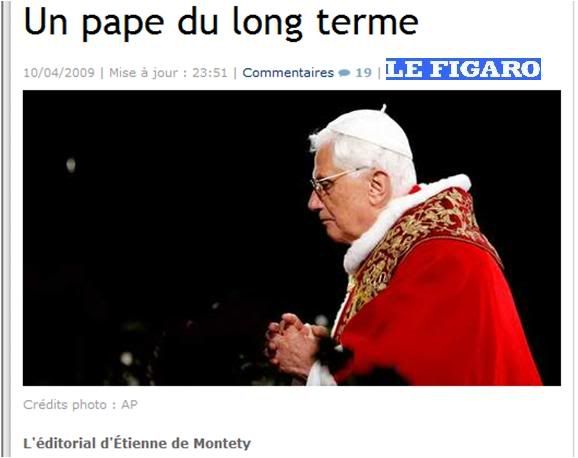
What will Benedict XVI be thinking of when he celebrates the Mass of the Resurrection on St. Peter's Square? To the recent weeks which saw the bimillennial ship (to echo Andre Forssard) assailed by a storm of controversy and anathema?
But it is all within the order of things that the Lenten season should be marked by trials. Should the joy of Easter come without the Catholic Church having to endure testing, temptation, injustice?
And would this not recall to Benedict XVI those days in April 2005, when, after the funeral for John Paul II, he was carried by the cardinals onto the Chair of Peter?
Not that his predecessor's Pontificate was nothing but tranquil, An iron fist against Communism, an alert against the excesses of liberalism and relativism, and not a few media hurricanes.
For example: the hue and cry cver his recall of Jacques Gaillot as bishop of Evreux [Gaillot is an ultra-liberal French bishop who was asked by the Vatican to resign as Bishop of Evreux in 1995 after years of openly advocating all the liberal positions that are against Church teaching, from abortion to gay marriage to opposing priestly celibacy, in the name of 'solidarity with the people' He continues to be a bishop at large.]
Or the hue and cry after he made statements about condoms and AIDS in Uganda [Which, curiously, not one journalist referred to in the mass assault against Benedict xVI for what he said about the same issue!]
How do the recent controversies around Benedict XVI enter into an assessment of his Pontificate thus far?
It was precisely with a long-term view that Benedict XVI made it clear when he became Pope four years ago that he does not have 'a program of government' except God's will.
A professor rather than a 'minister', a pedagogue rather than a 'communicator', he has udnertaken a 'catechetical cycle', one might say, to give back to Christians the fundamentals of the faith, and to all men, some markers for living.
Benedict's undertaking is for the long term. But he has a bad press, every ready to trip him up, to rebut him. But really, what sense is there to interrupt the professor in the middle of his lecture? Of judging him during the school year without letting him run his course?
The Pope knows very well that the world lives in impatience. That the tempo of indignation-emotion leads everyone into a dance in which reason finds no place. Our mentality as modern men judges a tree by its appearance ,when eternal wisdom says it must be judged by its fruits.
Four years after his installation as the head of the Catholic Church, who has really read and re-read Benedict's great texts, away from the fracas of imprecations?
Who has really read the Regensburg lecture (not merely the quotation from the Byzantine emperor Manuel II), his letter to the bishops (and not merely Bishop Williamson's outrageous statements), his homilies in Yaounde and Luanda (not just fragments of them)?
Whether he's addressing the young people of France or the leaders of the world (United Nations, April 2008), Benedict XVI calls on men to elevate themselves - be it in their social, emotional, professional lives - Benedict wants all of mankind to aim higher, do better.
A the moment, Benedict XVI is placing the finishing touches on a social encyclical. Not to compete with the IMF or the G20 leaders on matters of credit, employment or golden parachutes. But he will not keep himself from reminding us of our duties with regard to the poor and social justice.
He will do so with the seriousness and subtleness that he is known for. And it is up to us to listen or not, to share his positions, if we would, in favor of justice and of life.
[Modificato da TERESA BENEDETTA 15/04/2009 13:13] |
|
 14/04/2009 22:51 14/04/2009 22:51 |
|
| | | OFFLINE | Post: 359 | Registrato il: 29/11/2005
| Utente Senior | |
|
TERESA BENEDETTA, 14.04.2009 12:51:
It's time for some changes, anyway.
???
Teresa! What does this mean???
*********************************************************************
Dear Simone ... I'll have a better idea by April 19. Whatever it is, it will be a matter of form, not of substance.
TERESA
[Modificato da TERESA BENEDETTA 15/04/2009 13:15] -------------------------------------------------------------------------------------
Wer glaubt, ist nie allein, im Leben nicht und auch im Sterben nicht.
(PREDIGT DES HEILIGEN VATERS BENEDIKT XVI. ZUR AMTSEINFÜHRUNG 24. April 2005) |
 15/04/2009 13:38 15/04/2009 13:38 |
|
| | | OFFLINE | | Post: 17.132 | Registrato il: 28/08/2005
| Utente Gold | |
|

April 15
 Blessed Caesar De Bus (France, 1554-1607)
Blessed Caesar De Bus (France, 1554-1607)
Founder, Fathers of the Christian Doctrine
ORA for 4/14-4/15:

In his Easter message, Benedict XVI calls for persons who can restore hope:
'The world needs men and women who work for justice and love'
Page 1 photo shows Easter Vigil Mass for the earthquake victims of L'Aquila: 'The Easter candle lights the darkness';
right photo shows one of the baptisms performed by the Holy Father during the Easter Vigil Mass.
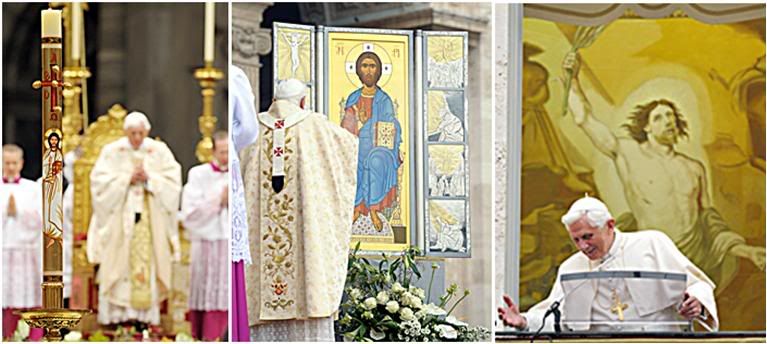 The issue contains the texts of the Pope's homilies at the Easter Vigil and the Easter Morning Mass, his Urbi et Orbi message, and
The issue contains the texts of the Pope's homilies at the Easter Vigil and the Easter Morning Mass, his Urbi et Orbi message, and
his remarks at the Regina Caeli in Castel Gandolfo yesterday. Other page 1 stories: North Korea drops out of 6-nation talks and
announces it will proceed weith its nuclear weapons program; in Thailand, aermy itnervention halts anti-government protest riots.
THE POPE'S DAY
General Audience today - The Holy Father spoke further on the significance of the Resurrection.
POPE BENEDICT ACCEPTS
CARDINAL ZEN'S RESIGNATION
The Holy Father has accepted the resignation of Cardinal Joseph Zen Ze-Kiun as Archbishop of HongKong
and has named his coadjutor, Mons. John Yong Hon to succeed him.
[Modificato da TERESA BENEDETTA 15/04/2009 14:20] |
 15/04/2009 14:10 15/04/2009 14:10 |
|
| | | OFFLINE | | Post: 17.133 | Registrato il: 28/08/2005
| Utente Gold | |
|
 GENERAL AUDIENCE TODAY
GENERAL AUDIENCE TODAY
The Holy Father came to the Vatican today by helicopter from Castel Gandolfo for his Wednesday General Audience at St. Peter's Square, attended by some 35,000 pilgrims.
He spoke about the significance of the Resurrection. Here is how he synthesized the catechesis in English:
Today’s General Audience takes place at the beginning of the liturgical season of Easter, the joyful celebration of the resurrection of Jesus from the dead.
The Easter Sequence sings the victory of the Lord of life who, after a heroic struggle with death, now lives triumphant. After the Via Crucis of Good Friday, our solemn Easter Vigil sets us on a Via Lucis marked by consolation, peace and hope.
It is fundamental for our faith and our Christian witness that we proclaim the resurrection of Jesus of Nazareth as a real, historical event.
His resurrection was not a simple return to existence, but an entrance into a new dimension of life meant to transform every human being, all history and the whole cosmos.
Saint Paul, writing to the Corinthians, reminded them of what was transmitted from the beginning, namely that Christ died and rose from the dead in accordance with the Scriptures.
As the Suffering Servant of God, Jesus purified us from our guilt by carrying our sins and interceding for us. By dying he put an end to death, and by rising he brought new life to the world.
May the joy of the resurrection of Christ give us courage to live his Gospel faithfully and bear witness to it generously!
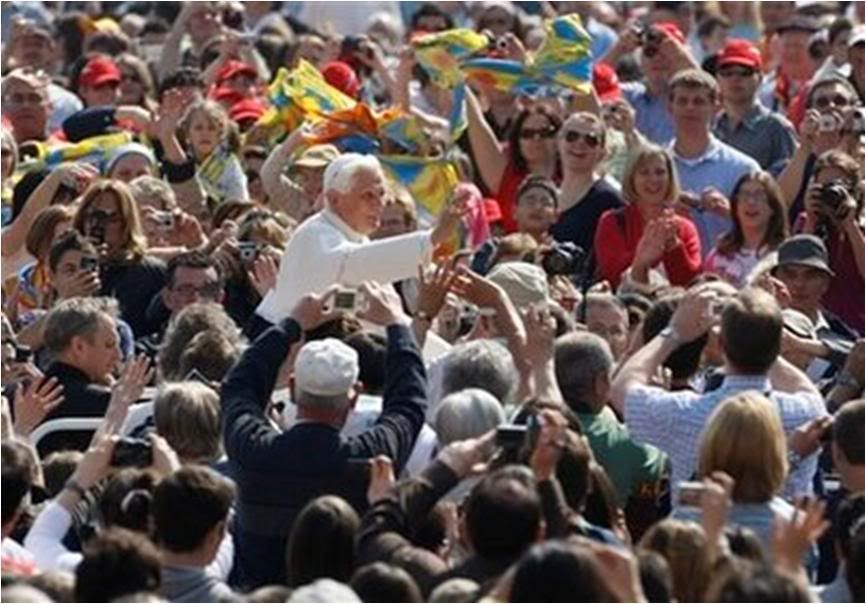
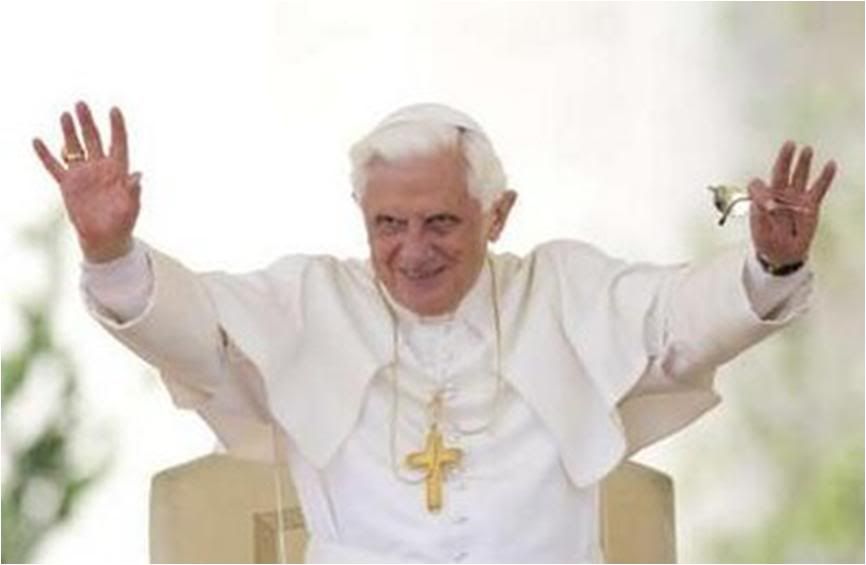
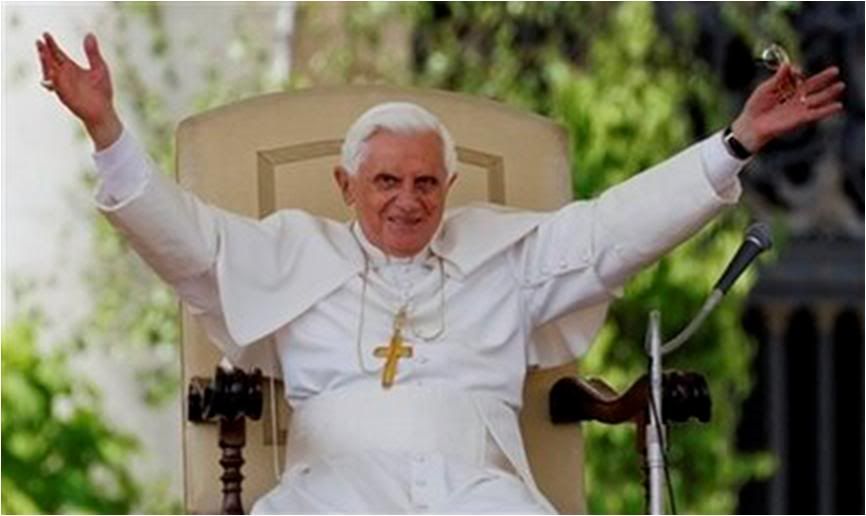
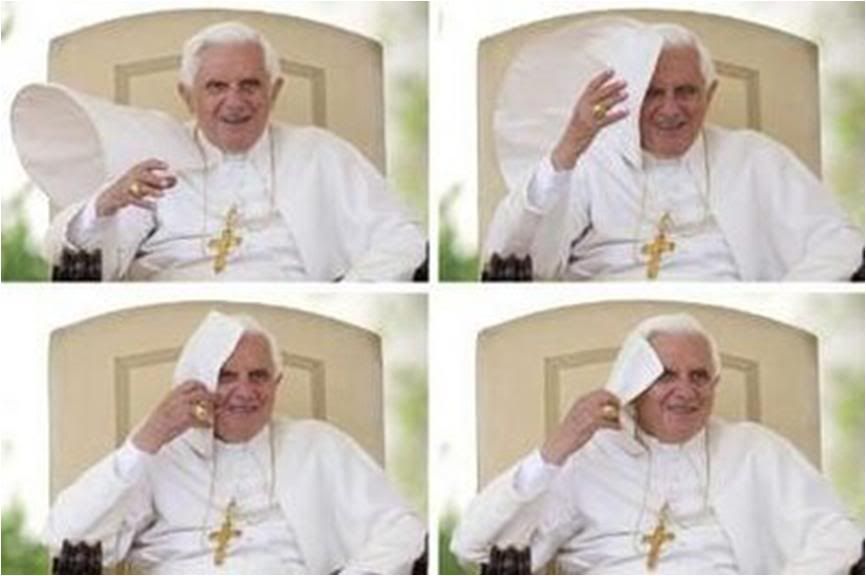
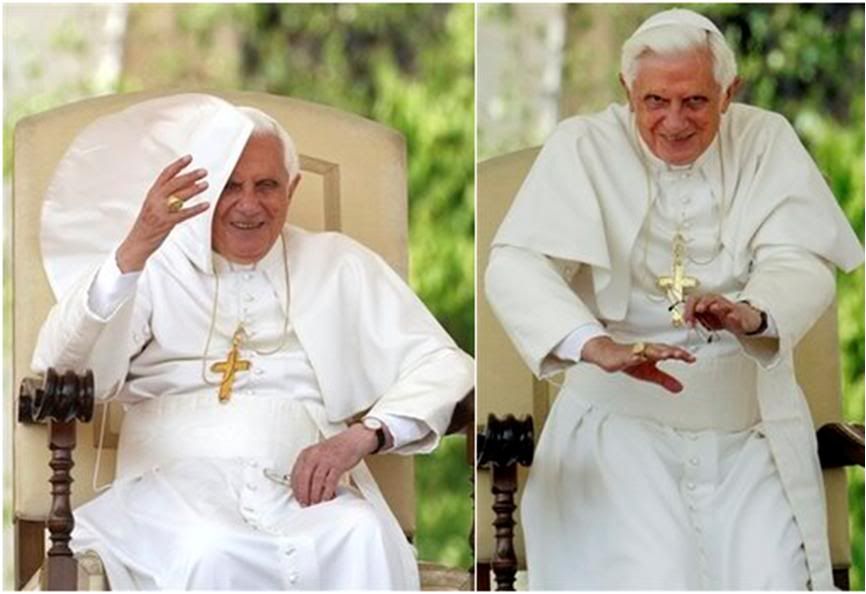 Early birthday greetings
Early birthday greetings
for the Holy Father

Vatican City, April 15 (AsiaNews) – About 25,000 people were present in St Peter’s Square for today’s general audience. They sang “Happy Birthday” to Benedict XVI in several languages (English, French, German, Spanish, Portuguese, Croatian and Italian) to mark his 82nd birthday — the Pontiff was in fact born in Marktl am Inn (Germany) on 16 April 1927 — and the anniversary of his pontificate (19 April). Choirs sang to the sound of musical bands as Benedict XVI looked on, smiling.
[Vatican Radio estimated the crowd at 40,000; AP at 35,000.]
In his address to the gathering the Holy Father spoke about the “overwhelming novelty” of Easter, the “spiritual bliss that no suffering or pain can erase” because based on the “certainty that Christ with his resurrection was the triumph of good over death and evil.”
Novelty and bliss generate “a festive atmosphere that lasts for 50 days, until Pentecost, as the mystery of Easter embraces our entire existence” and is “so important that the Church never ceases proclaiming it, each Sunday, the weekly Easter of the people of God.”
The Resurrection, Benedict XVI stressed, “is a real, historical event, attested by many important witnesses. We strongly reaffirm it because today there are those who would deny its historical nature, reducing the evangelical account to a myth, thus repeating old worn-out theories as if they were new and scientific.”
The truth of the Resurrection is not however “a simple return to a previous life, as was the case for Lazarus, but is the passage to a new dimension of life, one that is deeply new, that involves in a new dimension the whole of the human family, [. . .] illuminating our entire earthly pilgrimage, including the human enigma of pain and death.”
It is “the central nucleus of our creed.” It “involves universal history” and “has given a new dimension to this world, changing the existence of eyewitnesses.” It is “the announcement that generations of men and women through the centuries have welcomed and born witness to, frequently at the cost of their own life.”
Lastly the Resurrection “is an event that carries in itself a logos, a logic. It testifies that the Word of God has become flesh.”
In concluding the Pope said: “Let us be enlightened by the splendour of the Risen Lord. Like Saint Paul who met the Divine Master in an extraordinary fashion on his way to Damascus, we cannot keep to ourselves this truth which changes everyone’s life. We must bear witness to divine love.”
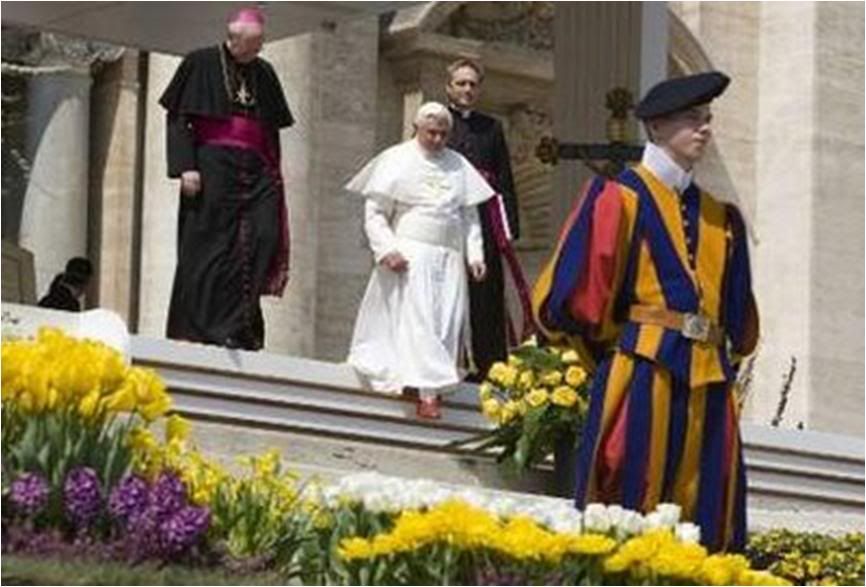
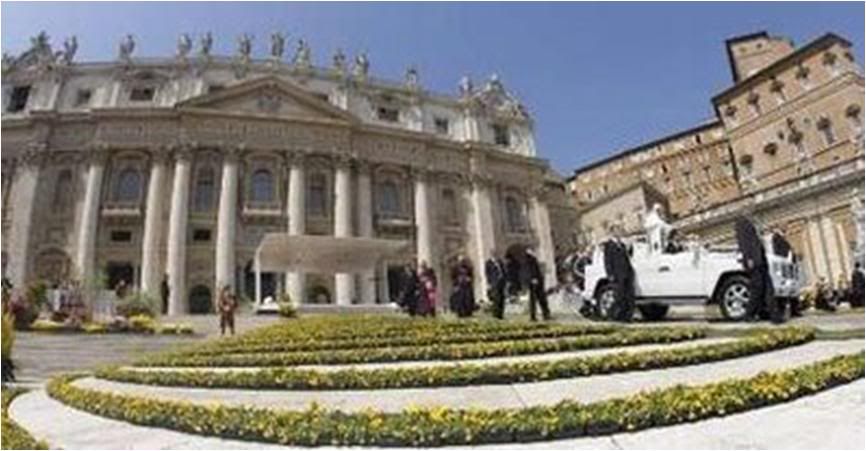
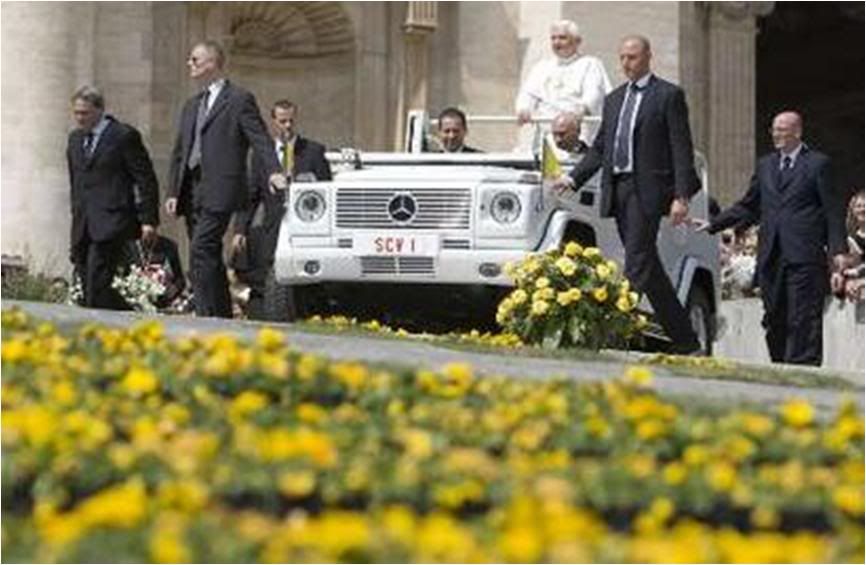
The Pope flew back to Castel Gandolfo after the audience. He is expected to return to the Vatican on Sunday in time for the Regina caeli prayers at noon.
Here is a full translation of today's catechesis:
Dear brothers and sisters,
The usual General Audience on Wednesday is pervaded today with spiritual joy, that joy which no suffering or pain can annul. Because joy arises from the certainty that Christ, through his death and resurrection, has definitively triumphed over evil and death.
"Christ is risen, Alleluia!" - the Church sings in celebration. And this festive atmosphere, the sentiments typical of Easter, continue not only this week - the Octave of Easter - but extends through the 50 days till Pentecost. Better yet, we might say that the mystery of Easter embraces the entire arc of our existence.
At this liturgical period, there are so many Biblical references and stimuli to meditation that are offered to us which deepen the significance and the value of Easter.
The Via Crucis, which during the Sacred Triduum we travelled with Jesus towards Calvary, reliving thereby his sorrowful Passion, became the comforting Via Lucis - way of light - at the Easter Vigil.
Seen from the Resurrection, we can say that all these paths of suffering are a way of light and spiritual rebirth, of interior peace and firm hope.
After the tears and the loss of Good Friday, followed by the expectation-laden silence of Holy Saturday, on the dawn of 'the first day after the Sabbath', the proclamation of Life defeating death resounded vigorously: "Dux vitae mortuus/regnat vivus" - The Lord of life was dead; but now he lives and triumphs.
The mind-blowing novelty of the Resurrection is so important that the Church does not cease to proclaim it, prolonging its remembrance especially every Sunday. Every Sunday is, in fact, the day of the Lord, the weekly Easter for the people of God.
Our Oriental brothers, as if to testify how much this mystery of salvation invests our daily life, refer to Sunday as the 'day of the resurrection' (voskreshenye).
It is therefore fundamental for our faith and for our Christian testimony to proclaim the resurrection of Jesus of Nazareth as a real event, a historical happening attested to by many authoritative witnesses.
We affirm it forcefully because, even in our time, there is no lack of those who seek to deny its historicity, who would reduce the evangelical account to a myth, to a 'vision' of the Apostles, rehashing and presenting old and exhausted theories as new and scientific.
Certainly the resurrection was not a simple return by Jesus to his preceding life on earth. In this regard, in fact, it would be a thing that had happened before. Two thousand years ago, someone had resurrected and returned to his previous life - Lazarus. [Jesus worked this miracle the Friday before Palm Sunday.]
But Christ's resurrection is in a different dimension: it is the passage to a profoundly new dimension of life which is of interest to us, which involves the human family, history and the universe.
This event which introduced a new dimension of life, an opening of our world to eternal life, changed the existence of its eyewitnesses, as the Gospel accounts and other New Testament writings show.
It is an announcement that entire generations of men and women through the centuries have welcomed with faith and to which they have borne witness, not rarely, at the cost of their blood, knowing that they were entering thereby into this new dimension of life.
Even this year, the Good News resounds at Easter unchanged and ever new, in every corner of the earth. Jesus who died on the Cross is resurrected; he lives gloriously because he has defeated the power of death. He has brought the human being to a new communion of life with God and in God.
This is the victory of Easter, our salvation! Thus, we can sing with St. Augustine: "The resurrection of Jesus Is our hope", because it introduces us to a new future.
It is true: the resurrection of Jesus establishes our firm hope and illumines our entire earthly pilgrimage, including the human enigma of suffering and death. Faith in Christ crucified and risen is the heart of the entire Gospel message, the central nucleus of our Credo.
We can find an authoritative expression of this essential creed in a famous Pauline passage, from the First Letter to the Corinthians (15,3-8), where the Apostle, to answer some in the community of Corinth who paradoxically proclaimed the resurrection of Christ but denied that of the dead - our hope - faithfully transmits what he, Paul, had received from the first apostolic community about the death and resurrection of the Lord.
He begins with a statement that is almost peremptory: "Now I am reminding you, brothers, of the gospel I preached to you, which you indeed received and in which you also stand. Through it you are also being saved, if you hold fast to the word I preached to you, unless you believed in vain" (vv 1-2).
He adds immediately that he transmitted to them what he himself had received. Then follows the pericope which we heard at the start of our meeting today. [Those who follow the audiences on radio or who have attended one in person know that the GA is usually opened with a Gospel reading by one of the priests, which I believe the Vatican should include in its bulletin on the GA.]
St. Paul presents, first of all, the death of Jesus, and adds, in a rather sparse text, two points to the statement "Jesus died". The first addition is: he died 'for our sins', and the second, 'according to the Scriptures' (v 3).
This expression, 'according to the Scriptures', places the event of the Lord's death in relation to the Old Testament story of God's covenant with his people, and makes us understand that the death of the Son of God belongs to the fabric of the story of salvation, and that this story receives from Scripture its logic and its true meaning.
Until the moment of Christ's death, it had remained almost an enigma, whose outcome was still uncertain. In the Paschal mystery is fulfilled the words of Scripture: that is, this death that happened 'according to the Scriptures' is an event that carries in itself a logos, a logic; the death of Christ testifies that the Word of God had become 'flesh' to the very depth, it had become part of human 'history'.
How and why this took place one understands from the other addition that St. Paul makes: Christ died 'for our sins'. With these words, the Pauline text takes up the prophecy of Isaiah contained in the Fourth Song of the Servant of God (cfr Is 53,12).
The Servant of God, says the song, 'stripped himself to death', he carried 'the sins of many', and interceding for the 'sinful, was able to bring the gift of reconciliation to men among themselves and of men with God: his death therefore put an end to death itself; the way of the Cross leads to the Resurrection.
In the verses that follow, the Apostle dwells on the resurrection of the Lord. He says that Christ "rose on the third day according to the Scriptures". Again, "according to the Scriptures"!
Not a few exegetes have seen in this expression, "He rose again on the third day, according to the Scriptures", a significant recall of what we read in Psalm 16, where the Psalmist proclaims:"For you will not abandon me to Sheol [the underworld] , nor let your faithful servant see the pit" (v 10).
This is one of the Old Testament texts, often cited in early Christianity, to prove the messianic character of Jesus. Since according to Judaic interpretation, corruption [of the body] begins after the third day, the word of Scripture is fulfilled in Jesus who rises on the third day, before corruption can set in.
St. Paul, faithfully transmitting the teaching of the Apostles, underscores that the victory of Christ over death takes place through the creative power of God. This divine power brings hope and joy: this is the definitive liberating content of the Paschal revelation.
In the Resurrection, God reveals himself and the power of the Trinitarian love which annihilates the destructive forces of evil and death.
Dear brothers and sisters, let us allow ourselves to be illuminated by the splendor of the risen Lord. Let us us receive his Gospel and adhere to it generously as did the privileged witnesses to his resurrection, as several years later, St. Paul did when he met the divine Master in an extraordinary manner on the road to Damascus.
We cannot keep to ourselves the announcement of this truth which changes the life of everyone. With humble trust, we pray: "Jesus, who in rising from the dead, anticipated our resurrection, we believe in you!"
I would like to conclude with an exclamation that Silvanus of Mt. Athos liked to repeat: "Rejoice, my soul. It is always Easter, because the risen Christ is our resurrection!"
May the Virgin Mary help us cultivate in ourselves and around us, this climate of Paschal joy, so we may be witnesses of divine love in every situation of our existence.
Once more, a happy Easter to all of you.
[Modificato da TERESA BENEDETTA 15/04/2009 20:52] |
 16/04/2009 05:08 16/04/2009 05:08 |
|
| | | OFFLINE | | Post: 17.136 | Registrato il: 28/08/2005
| Utente Gold | |
|
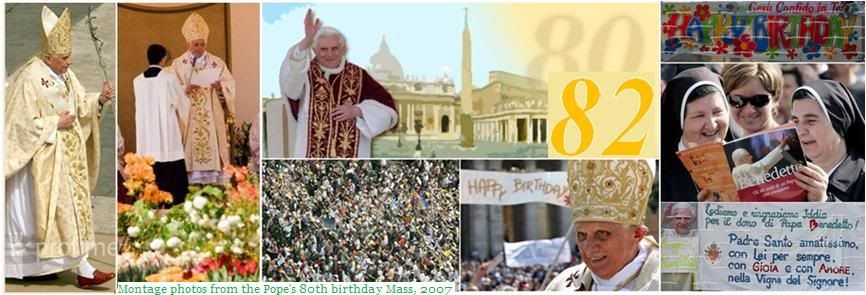 BENEDICT XVI: POPE OF THE SIMPLE FOLK
BENEDICT XVI: POPE OF THE SIMPLE FOLK
- And not a paradox
by Rodolfo Lorenzoni
Translated from

April 15, 2009
I will cite a personal experience only because I thought it is significant enough.
A few days ago, I was invited to a RAI-3 broadcast conceived and conducted by Corrado Augias [74-year-old TV host-journalist who teamed up with history professor Pesce to write two consecutive anti-Christian best sellers, INCHIESTO SU GESU (Inquiry on Jesus) and INCHIESTO SULLA CHIESA (Inquiry on the Church)].
In the minutes that preceded the start of the live broadcast, Augias, chatting informally with me, made a statement which I found striking: "I would like to understand and make others understand who this Pope really is, because frankly, I don't believe it is clear at all." [Typical statement by someone who simply does not wish to see what is abundantly evident and essentially simple!]
One of the most eminent representatives of secular culture in our country was saying that Benedict XVI constitutes for many an enigma still to be deciphered!
Who then is Papa Ratzinger? So many definitions have been attempted, each of which doubtless contains part of the truth: the theologian Pope, the Pope who defends Tradition, the Pope of liturgy, etc.
I wish to humbly offer for your consideration another definition, which takes nothing away from those already named but can only serve to enrich them: Benedict XVI is the Pope of the Simple Folk.
I know many will raise an eyebrow - How on earth, they may well ask, can someone who can raise us to the highest planes of theology, metaphysics, and doctrine be the Pope of Simple Folk?
The paradox is really only an apparent one, and Benedict XVI himself explained it. I wish to cite textually the words he said some 10 years ago addressing a conference about St. John:
It is not the educated ones who will determine what is true of our baptismal faith, rather it is our baptismal faith that determines what is valid in educated interpretations.
It is not the intellectuals who will take the measure of simple folk, but rather the simple who will take the measure of intellectuals.
The task of the Church Magisterium is to defend the faith of the simple people against the power of the intellectuals: it must protect the faith of the simple folk, those who do not write books, who do not speak on TV, and cannot write editorials in the newspapers - this is the Church's democratic role. It must give a voice to those who would otherwise have no voice at all.
A splendid doctrinal statement and a declaration of intention on the part of the man who, several years later, would present himself to the world as "a humble worker in the vineyard of the Lord".
[Modificato da TERESA BENEDETTA 16/04/2009 23:46] |
 16/04/2009 15:50 16/04/2009 15:50 |
|
| | | OFFLINE | | Post: 17.138 | Registrato il: 28/08/2005
| Utente Gold | |
|


ON YOUR 82ND BIRTHDAY, YOUR HOLINESS,
WE THANK GOD FOR GIVING YOU TO US.
WE THANK YOU FOR WHO YOU ARE AND ALL THAT YOU DO,
AND WE OFFER YOU ALL OUR LOVE AND PRAYERS.
AD MULTOS ANNOS, SANCTE PATER!
April 16
 St. Bernadette
St. Bernadette (1844-1879)
OR today.
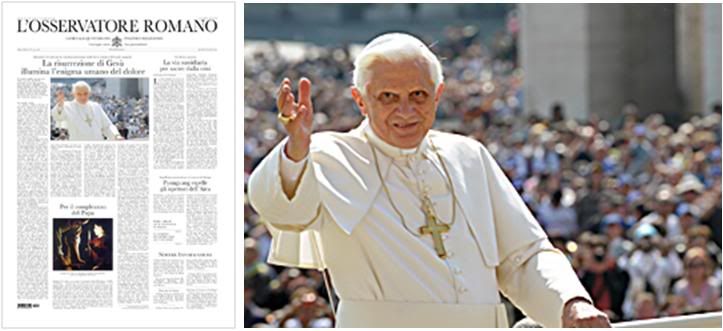
At his weekly audience, Benedict XVI reaffirms the historicity of the Paschal event:
'The resurrection of Jesus illumines the human enigma of suffering'
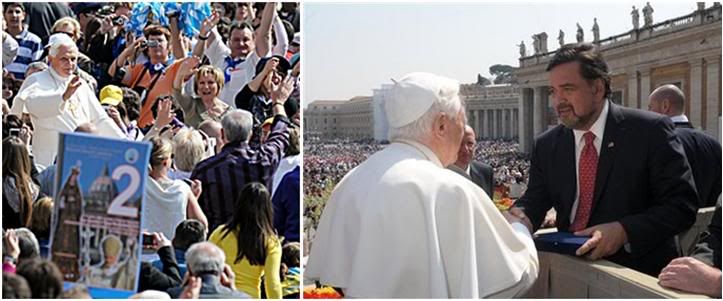 Page 1 also has a brief note on the Pope's birthday today; an editorial commentary that advocates applying 'subsidiarity'
Page 1 also has a brief note on the Pope's birthday today; an editorial commentary that advocates applying 'subsidiarity'
as national policy as a possible way out of the economic crisis; and North Korea's expulsion of IAEA observers. [Right photo
above shows the Pope greeting Gov. Bill Richardson of New Mexico, who came for a celebration at the Colosseum of his state's
abolition of the death penalty.]
No events scheduled for the Holy Father today.
Have a restful birthday, Holiness!
And we are happy to learn from Vatican Radio
that brother Georg is at Castel Gandolfo
to share the occasion.
The Vatican announced the Holy Father has appointed a successor to Cardinal Antonio Canizares Llovera
as Archbishop of Toledo and Primate of Spain, in Mons. Braulio Rodríguez Plaza, who was the Archbishop
of Valladolid. Cardinal Canizares is the Prefect of the Congregation for Divine Worship.
NB:
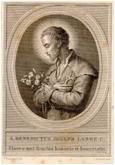 St. Benedict Joseph Labre (France, 1748-1783)
St. Benedict Joseph Labre (France, 1748-1783)
Confessor
In many Catholic calendars, April 16 continues to be commemorated
as the feast day of this mendicant saint who died on April 16, 1783
and was canonized in 1881. At the time Joseph Ratzinger was born,
he was most certainly the saint of the day - and what providential
coincidence that the saint's given name is Benedict Joseph! (His
feast is now officially commemorated on April 17.)
 FOR THE POPE'S BIRTHDAY
Translated from
FOR THE POPE'S BIRTHDAY
Translated from
the 4/16/09 issue of

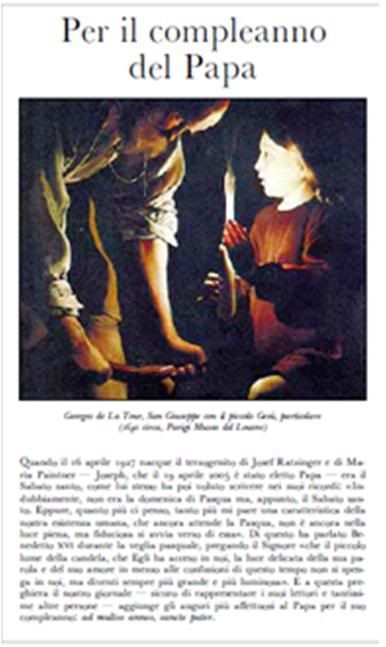 Illustration: Detail from 'Jesus and Joseph the carpenter', Georges de La Tour, 1645.
Illustration: Detail from 'Jesus and Joseph the carpenter', Georges de La Tour, 1645.
Oil on canvas, 137x101 cm. Louvre.
When, on April 16, 1927, the third child of Josef Ratzinger and Maria Ratzinger was born - Joseph, who would be elected Pope on April 19, 2005 - it was Holy Saturday, as he himself wrote in his memoirs:
"To be sure, it was not Easter Sunday but Holy Saturday, but the more I reflect on it, the more this seems to be fitting for the nature of our human life: we are still awaiting Easter; we are not yet standing in the full light but walking toward it full of trust."
Benedict XVI spoke of this at the Easter Vigil, praying that "the small candle flame that He has lit in us, the delicate light of his words and his love amidst the confusion of our time, may not be extinguished in us but become even bigger and more luminous".
To this prayer, our newspaper - certain that it represents its readers and so many other persons - ads its most affectionate greetings to the Pope on his birthday: ad multos annos, sancte pater!
TODAY IS BENEDICT XVI'S BIRTHDAY
Best wishes and thank you, Holy Father!
Translated from
the 4/16/09 issue of

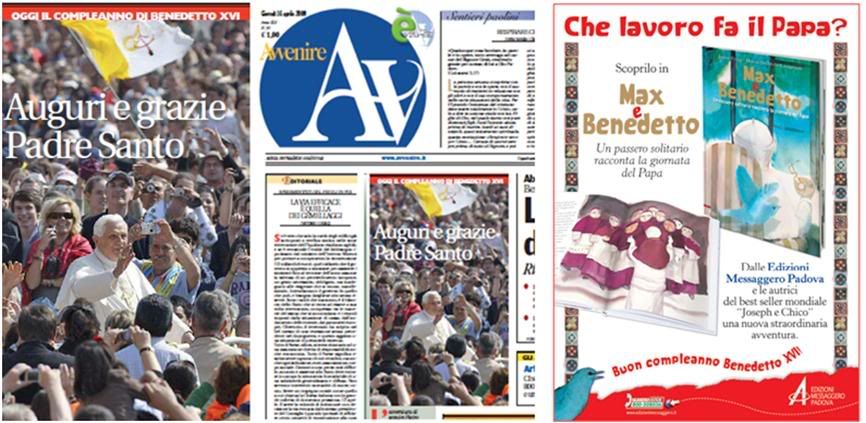
The adventure of following Peter day after day is the great gift given to us, in which we revel without tiring. The words, the travels, teh catecheses which give daily sustenance to our faith, and the looks, the gestures, the human and interior sensitivity that we have come to know so well...
Yes, Holy Father, everyday we discover more what it is to love you and to want to keep up with you, to where you want to lead us, towards what humanity seeks and asks about.
To tell you these little things today, with all our heart, is our small gift. Happy birthday, Holiness!
NB: Avvenire's back page is a full-page ad from the publishers of MAX E BENEDETTO [see story in POPE-POURRI posted yesterday], wishing the Holy Father a happy birthday.
[Modificato da TERESA BENEDETTA 17/04/2009 14:58] |
 17/04/2009 01:38 17/04/2009 01:38 |
|
| | | OFFLINE | | Post: 17.139 | Registrato il: 28/08/2005
| Utente Gold | |
|

 There is a bumper crop of stories and tributes in the Italian media today on the occasion of the Holy Father's 82nd birthday - and Lella has done her usual efficient round-up which saves me the time and effort of hunting down individual stories.
There is a bumper crop of stories and tributes in the Italian media today on the occasion of the Holy Father's 82nd birthday - and Lella has done her usual efficient round-up which saves me the time and effort of hunting down individual stories.
But before translating a few of the best birthday tributes, I wish to translate Sandro Magister's post today, since his regular translator appears to be one post late. I gratefully acknowledge Magister's unfailing effort to highlight the Magisterium of Benedict XVI. This is something other Vaticanistas have not done as faithfully and as thoroughly as he has done and continues to do.
That Easter event on which
the Church stands or falls
About the resurrection of Christ, the intellectuals of Athens told St. Paul,
"Let's leave that topic for another time" - and went away.
Benedict XVI is mindful that no one should miss it and has launched
the Easter message again Urbi et Orbi - twice in four days last week.

ROME, April 16, 2009 – On Easter Sunday, in his message to teh world from the central loggia of the Vatican Basilica, and then the following Wednesday, at his General Audience in St. Peter's Square, Benedict XVI placed the event of the resurrection of Christ at the center of his preaching.
He did it in accordance with the liturgical calendar, of course. But also with his declared objectives as Pope: to revive the faith where it is in danger of being extinguished, and to open a way to God for the men and women of today - "not to any God, but to the God who spoke on Sinai; to the God whose face we recognize in the love unto death manifested by Jesus Christ who was crucified and rose from the dead."
The two papal discourses of Easter Sunday and Wednesday constitute a profoundly unitary diptych which expresses more than ever the sense of this pontificate.
We know that Papa Ratzinger is writing the second volume of his book JESUS OF NAZARETH, principally dedicated to the Gospel accounts of the passion and resurrection of Jesus - it appears his draft is now well advanced.
In any case, anyone who wants a preview may find it in the two texts cited, reproduced here in full. [Full translations of both texts were posted earlier on this thread in a timely manner.]
Benedict has always insisted that the resurrection of Jesus "is not a theory but a historical reality; not a myth nor a dream; not a vision nor a utopia; not a fable, but a unique and unrepeatable event".
"We affirm it forcefully because, even in our time, there is no lack of those who seek to deny its historicity, who would reduce the evangelical account to a myth, to a 'vision' of the Apostles, rehashing and presenting old and exhausted theories as new and scientific", he stressed.
Already in the first volume of JESUS OF NAZARETH, Papa Ratzinger made clear the intention of his book: to say the entire truth about Jesus, true God and true man.
Without the entire truth of Jesus crucified and resurrected, the Pope said in his Easter Sunday message, there is no light to illumine "the dark zones of the world in which we live" and "there is no way out for man".
In his catechesis on Wednesday 'in albis' [Magister uses a traditional designation for the weekdays after Easter including the first Sunday after Easter, Whitsunday, which were denominated 'in albis' referring to the white garments worn by Christians newly-baptized at the Easter Vigil], Benedict went a step farther.
He illustrated the meaning of the Resurrection using the words in the Apostles Creed, the 'symbol' of Christian faith which the faithful around the world recite in every Mass.
He did this by going back to a passage in Paul's first letter to the Corinthians which is the source of the central articles of the Credo. In particular, the Pope underscored the sense of the formulation in both St. Paul and the Creed that accompanies the proclamation of the resurrection: 'according to the Scriptures'.
This formulation, he said, shows that the event of the death and resurrection of the Son of God "carries within itself a logos, a logic" - the only one that can explain the significance of man's entire history and that of the world.
But not a word more here. The thing is to read in full those two extraordinary texts by Benedict XVI.
 In many ways, this is a perfect companion piece to Roberto Lorenzoni's article two posts above about Benedict XVI as 'the Pope of the simple folk'. Papa Ratzinger is truly unparalleled when explaining the essentials of the faith in language that is clear and accessible to everyone.
In many ways, this is a perfect companion piece to Roberto Lorenzoni's article two posts above about Benedict XVI as 'the Pope of the simple folk'. Papa Ratzinger is truly unparalleled when explaining the essentials of the faith in language that is clear and accessible to everyone.
There is a second article similar to Magister's - an editorial - in the 4/16/09 issue of Avvenire, which I will post here upon translation.
[Modificato da TERESA BENEDETTA 17/04/2009 14:59] |
 17/04/2009 07:22 17/04/2009 07:22 |
|
| | | OFFLINE | | Post: 17.141 | Registrato il: 28/08/2005
| Utente Gold | |
|
 It's why they made him Pope
Translated from
It's why they made him Pope
Translated from

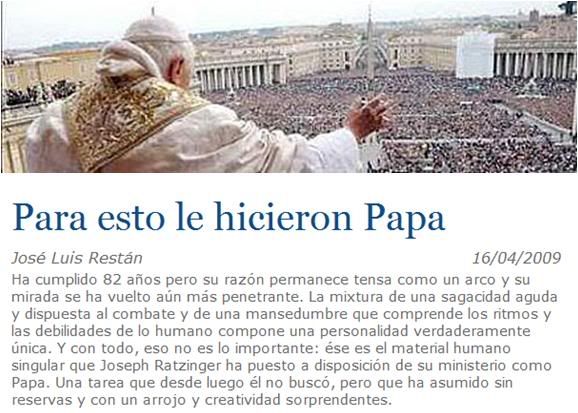
He is 82 years old but his mind remains snappy as a bowstring and his view of things even more penetrating. The mixture of wisdom that is sharp and ready for combat with a humility that understands the rhythms and weaknesses of man make up a personality that is truly unique.
And yet, all that is not the important thing - though that is the singular human material that Joseph Ratzinger has at his disposal for his ministry as Pope.
A task which, after all, he never sought, but which he has assumed without reservation and with surprising daring and creativity.
I will not reply here to the miserable article by Juan Arias in El Pais [leading Spanish newspaper], entitled "For this he wanted to be Pope" - because day-to-day reality can well rebut those lies.
I prefer to open up the truth - the example and the enchantment that we receive as gifts every day from this witness to the faith, this Successor of Peter in a difficult time, marked by the dullness of nihilism and by silent apostasy of wide sectors of a world that was once impregnated with Christian culture.
No Pope elects the historical conjunction in which he must exercise his ministry, but it is evident that Benedict XVI knows this conjunction to its most profound roots, and as dark as it may seem, he does not fear it.
He was born with the joyousness of his native Bavaria's baroque Catholicism, seasoned by his familiarity with the Fathers of the Church as well as contemporary thinkers.
He is a man rooted in the living Tradition of the Church, from which he nourishes himself continually, and precisely because of that, he walks lightly and without hesitation through contemporary landscapes and knows how to speak to men today.
In his Easter message, he said that a sense of emptiness tends to intoxicate mankind, making hope disappear, and that really, if Christ had not resurrected, then 'emptiness would end up winning'.
The first concern of his Pontificate is to offer the world this light which is born with the resurrection of Christ, since it is the only light capable of illuminating the dark zones of the human heart and of the world.
We know that the Pope is working intensively on the second part of his book JESUS OF NAZARETH which will focus on the passion, death and resurrection of the Lord.
I belie3ve that this book is his response as a theologian Pope to a pressing necessity of the Church, which can only carry out its mission if there is a renewed consciousness of a living and present Jesus.
But he is also working on his third encyclical, which will confront the social problems in this current cycle of the globalization process which consists of the financial crisis, cultural nihilism and the terrorist threat.
It is an immense topic which he will not address with simplistic moralisms, but with technical competence coupled with a perspective that is informed by the Gospel as lived and practiced in the historical body of the Church.
Because that view, informed by the Risen Lord, can provide uplift to the desperation today, not in a technical manner but through the witness of men and women who have seen that light and been changed by it.
The resurrection "is not a myth or a dream, not a vision or a utopia, not a fable but a unique and unrepeatable event - Jesus, son of Mary, who in the twilight of Good Friday was taken down from the Cross and buried, and then arose triumphant from the tomb".
This is the faith professed by Benedict. And it was to confirm all Christian peoples in this faith, to proclaim it persuasively and rationally from the rooftops of the world, that he was elected Pope at the age of 78.
What wounds the heart of this Good Shepherd is the absence of God, the abandonment by so many of our contemporaries of his saving embrace.
That and the blindness of some men of the Church engaged in self-destructive disputes, and in their arrogant attack to the simple but demanding profession of love that Peter continues to bring the world.
Yes, it was for this they made him Pope. To defend the faith of the simple folk, to correctly carry out the creative dialog of the Church with the modern world, to widen the scope of reason that is threatened in the West by a terrible shrinkage and narrowness, to draw men in distress into the warm embrace of the Church.
The Pope has no magic wand to do all this, nor can he resolve all problems with just his own powers. As Joseph Ratzinger has reminded very so often, the Pope's first duty is to obey, to be in the center of the great vital network of the Church in order to insure its unity, and from there, to confirm, nourish and inspire all the shoots of new life that the Spirit causes to emerge.
And that is how we see Pope Benedict XVI as he celebrates his 82nd birthday today - joyous and humble, wise and penetrating, obedient to the service that the Lord has imposed on him, sure that there can be no better way for his own personal happiness.
Happy birthday, Your Holiness!
|
 17/04/2009 14:19 17/04/2009 14:19 |
|
| | | OFFLINE | | Post: 17.143 | Registrato il: 28/08/2005
| Utente Gold | |
|

 Pope Benedict XVI spends
Pope Benedict XVI spends
82nd birthday resting

Castel Gandolfo, Italy, April 16 (dpa) - Following a week of intense Easter festivities, Pope Benedict XVI was set Thursday to spend his 82nd birthday resting at the papal residence of Castel Gandolfo in the hills south of Rome.
The low-key commemoration contrasted with April 16, 2008 when Benedict, who was on an apostolic visit to the US, was feted in Washington by then US President George W Bush.
On that occasion a choir [No, it was the people present] sang "Happy Birthday" for the Pontiff on the White House lawn.
In March this year Benedict made his first trip to Africa as pontiff when he visited Cameroon and Angola, while his next trip abroad is scheduled in May when he will travel to Jordan, Israel and the Palestinian Territories.
Before then, he is expected to visit Italy's central Abruzzo region which last week was struck by a devastating earthquake in which almost 300 people were killed.
Unlike many other monarchies, Vatican City state does not officially celebrate birthdays of popes but holds public holidays to mark the anniversary of their election.
Benedict who took that name following his election on April 19, 2005, was born as Joseph Ratzinger in the town of Marktl am Inn, Bavaria, Germany.
AP chose to report on the birthday this way:
New children's book
illustrating Pope's daily routine
published on Pontiff's 82nd birthday
By NICOLE WINFIELD
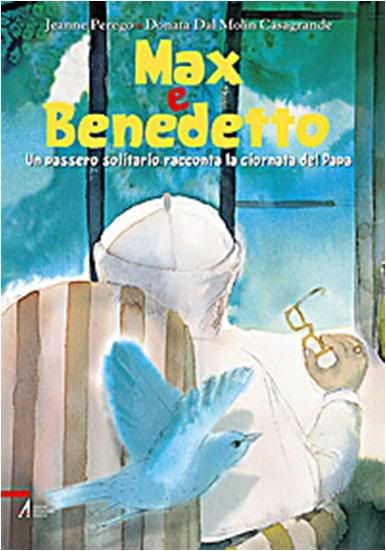
VATICAN CITY, April 16 (AP) - A new illustrated children's book detailing Pope Benedict XVI's daily life was published Thursday as the pontiff celebrated his 82nd birthday in the quiet company of his older brother.
"Max and Benedict," about a sparrow's impressions of the pope from his perch on St. Peter's Basilica, is a sequel of sorts to the 2007 children's book "Joseph and Chico," which told the story of the pope's early years from the point of view of a tabby cat.
The new book contains no revelations about the Pontiff's daily routine, but its narrator, Max, proves to be a charming eyewitness to the work both spiritual and bureaucratic that occupies Benedict's day.
"I can say he's a tireless worker, but also likeable and cordial," a longtime collaborator of the pope, Monsignor Damiano Marzotto, wrote in a prologue to the book.
There's Mass at around 7 a.m. with Benedict's "family" — his two secretaries, cook and other aides. Around 8 a.m., he moves into his study to read the newspapers, correspondences, documents and speeches he will deliver later in the day.
"If only you knew how much he reads in a day!" Max marvels. "We shouldn't be surprised, since the life of the Catholic church in every corner of the world passes by his desk."
At 10:30 a.m., audiences begin with Vatican cardinals, visiting prelates and dignitaries. Many are so nervous they constantly check to see that their ties or vestments are straight, their hair combed and shoes shined, only to be put at ease by his cordiality, Max observes.
At 1 p.m. he returns to the papal apartment for a "simple lunch," followed by a walk on the palazzo roof terrace, where, Max notes, no one but he can see the Pope.
Benedict is back in the office by 3 p.m. but he takes a break an hour later to stretch his legs in the Vatican gardens, where he recites the rosary and prays before the grotto of the Madonna of Lourdes.
By 5 p.m. he is back at his desk. This is the time, Max notes, that Benedict likes to write, although he often has to meet with cardinals once again. By dusk, Benedict can rest.
"After a dinner like that of a little bird, he watches the news and then relaxes with a book or some music," Max observes, noting that occasionally Benedict plays the piano before retiring to his room.
The book was written by Jeanne Perego and illustrated by Donata Dal Molin Casagrande, who teamed up for "Joseph and Chico," which publisher Edizioni Messaggero Padova said has sold tens of thousands of books in 14 countries. An English edition is expected soon.
Most of the information about the pontiff's daily routine has been published in some form or another in the Italian media over the years.
The book was published as Benedict spent his 82nd birthday with his brother, Monsignor Georg Ratzinger, at the papal summer retreat in the hills south of Rome.
Monsignor Ratzinger, whom the pontiff has described as his trustworthy guide and companion, is a frequent visitor to Castel Gandolfo and last year was named an honorary citizen of the town.
Benedict is spending the week at the residence to relax after his busy Holy Week services. He is due back at the Vatican on Sunday.
[Modificato da TERESA BENEDETTA 17/04/2009 15:13] |
 17/04/2009 14:21 17/04/2009 14:21 |
|
| | | OFFLINE | | Post: 17.144 | Registrato il: 28/08/2005
| Utente Gold | |
|

April 17
 St. Benedict Joseph Labre (France, 1748-1783)
St. Benedict Joseph Labre (France, 1748-1783)
Confessor
OR today.
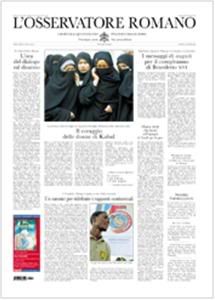 Page 1 has a brief story about the Pope's birthday yesterday.
Page 1 has a brief story about the Pope's birthday yesterday.
All the other stories are secular: Time for new dialog between
Russia and the US; the courage of the kabul women who demonstrated
against a new Afghan law sanctioning forced sex with husbands;
Obama asks Israel to clarify its commitment to peace; and about
the summit of the Americas this weekend in Trinidad-Tobago.
No events scheduled for the Holy Father today.
Tomorrow, he meets representatives of the Franciscan community
on the occasion of the 800th anniversary of the founding of
the order by St. Francis of Assisi.
|
 17/04/2009 14:43 17/04/2009 14:43 |
|
| | | OFFLINE | | Post: 17.145 | Registrato il: 28/08/2005
| Utente Gold | |
|
 VATICAN REPLIES TO BELGIAN
VATICAN REPLIES TO BELGIAN
PARLIAMENT'S PROTEST TO
THE POPE'S STATEMENTS ON AIDS
 Here is the official English text of a statement released today by the Vatican Secretariat of State.
Here is the official English text of a statement released today by the Vatican Secretariat of State.
The Ambassador of the Kingdom of Belgium, acting under instructions from the Minister of Foreign Affairs, has informed the Secretary for Relations with States of the Resolution with which the House of Representatives in his country asked the Belgian Government to "condemn the unacceptable statements of the Pope on the occasion of his journey to Africa and to protest officially to the Holy See". The meeting took place on 15 April 2009.
The Secretariat of State notes with regret this action, unusual in the context of the diplomatic relations existing between the Holy See and the Kingdom of Belgium.
It deplores the fact that a Parliamentary Assembly should have thought it appropriate to criticize the Holy Father on the basis of an isolated extract from an interview, separated from its context, and used by some groups with a clear intent to intimidate, as if to dissuade the Pope from expressing himself on certain themes of obvious moral relevance and from teaching the Church’s doctrine.
As is well known, the Holy Father, in answer to a question concerning the efficacy and the realistic character of the Church’s positions on combating Aids, stated that the solution is to be sought in two directions: on the one hand through bringing out the human dimension of sexuality; and on the other, through true friendship and willingness to help persons who are suffering.
He also emphasized the commitment of the Church in both these areas. Without this moral and educational dimension, the battle against Aids will not be won.
While in some European countries an unprecedented media campaign was unleashed concerning the predominant, not to say exclusive, value of prophylactics in the fight against AIDS, it is consoling to note that the moral considerations articulated by the Holy Father were understood and appreciated, in particular by the Africans and the true friends of Africa, as well as by some members of the scientific community.
As one can read in a recent statement of the Regional Episcopal Conference of West Africa (CERAO): "We are grateful for the message of hope which [the Holy Father] came to entrust to us in Cameroon and Angola. He came to encourage us to live in unity, reconciled with one another in justice and peace, so that the Church in Africa can herself be a burning flame of hope for the life of the entire continent. And we thank him for having restated for all, in a nuanced, clear and insightful way, the common teaching of the Church concerning the pastoral care of sufferers from Aids."
Other than the fact that it took the Secretariat of State this long to reply to something that happened two weeks ago - perhaps they only just got the letter from the Ambassador of Belgium - one must note again that it seems inconceivable that not a single member of the Belgian parliament which passed this resolution was unaware of the objective evidence and the scientific support for the Pope's statements regarding condoms and AIDS.
Can Belgian politicians be that mindlessly prejudiced? Apparently, its Parliament members are - and their resolution must go down in history as one of the most stupid parliamentary resolutions ever passed, and a flagrant act of lese-majeste against a sitting head of state.
The Secretariat of State should have protested the offense to the Pope - 'condemn as unacceptable'???? - not just 'regret' and 'deplore' it - which also an offense against free speech.
How dare a supposedly democratic Parliament 'condemn as unacceptable' any statement made by anyone, Pope or not, in the exercise of free speech - a statement, moreover, that is 'unacceptable' only to the closed bigoted minds of people like these Belgian lawmakers, and is supported by fact and by important sectors of the scientific community?
 I'm not sure the Curial offices most concerned have learned any lessons from the communications snafus of the first quarter of 2009 which have boomeranged against the Pope more than anyone else - in short, against he who least deserves any of this abuse.
I'm not sure the Curial offices most concerned have learned any lessons from the communications snafus of the first quarter of 2009 which have boomeranged against the Pope more than anyone else - in short, against he who least deserves any of this abuse.
I don't remember L'Osservatore Romano coming out with any timely forceful responses to the onslaught that followed the Pope's inflight news conference, much less from the Secretariat of State, notwithstanding the fact that the Secretary of State himself was travelling with the Pope at the time and was beside him at the time of that news conference.
And OR now calls attention to that painful sin of omission by coming out with an editorial commentary in the 4/18/09 issue to accompany the Secretariat of State's belated reply to the benighted bigots of the Belgian Parliament....
And oh yes, the same issue also belatedly publishes the Italian translation of a March 27 letter from the French-speaking bishops of West Africa expressing their support for the Pope on the AIDS issue and denouncing the politico-media campaign in Europe against the Pope.
Beyond prejudice:
Voices outside the chorus
by Giuseppe Fiorentino
Translated from
the 4/18/09 issue of

There have been few voices who have sought to go beyond facile prejudice in the controversy raised by the media - especially in the West - over the words of Benedict XVI about the battle against AIDS in Africa.
But it would not be easy to keep from joining the chorus when assailed, as the case was, by a massive media campaign which misrepresented the Pope's statements, aggressively promoting such distortion.
A strong denunciation of this operation put into action by so many international media organs came from the Regional Bishops' Conference of French-Speaking West Africa (CERAO) - the bishops of Benin, Burkina Faso, Guinea, Guinea-Bissau, Ivory Coast, Mali, Mauritania, Niger, Senegal adn Togo - in a message issued on March 27, which we are publishing in full on this page.
It expresses surprise and sorrow at what they call "an outrageous planned manipulationc[by the media] resulting in a systematic blocking out of Benedict XVI's message of hope, justice and peace" during his African trip.
"It is absolutely intolerable," the bishops' statement said, "that a small group of media operators - unfortunately including some Africans, who draw without scruples from the 'filthy' wealth of those who have plundered their countries - who have arrogated the right to deform the truth in order to present themselves as responsible benefactors of our brothers and sisters who are tragically afflicted with HIV-AIDS, while transforming the Holy Father into someone who is 'irresponsible' and lacking in humaneness".
Earlier, the prelates of the Bichops' Conference of Angola and Sao Tome (CEAST) issued a statement lamenting the fact that the Western media had practically 'ignored the Pope's visit' by concentrating on the sterile polemics over AIDS, thus "annulling the extremely positive outcome of the visit".
The intervention by the bishops of CEAST and CERAO followed the statement in support of the Pope from the Bishops' Conference of Cameroon in a statement published by L'Osservatore Romano on March 27.
Attestations of solidarity with Benedict XVI came from many other African sources, as manifested by hundreds of African students in Rome who demonstrated in St. Peter's Square before the Pope's Angelus prayers on March 24.
But even in the mass media themselves - once the polemical exploitation had died down - articles and letters have started to appear which, at the very least, tend to make the reader ask himself whether indeed the Pope is right.
An example is the influential French newspaper Le Monde. During the Pope's visit in Africa, that newspaper had published articles that labelled Benedict XVI 'irresponsible'. But on Saturday, April 11, it published an article by some scientists and veterans in the fight against AIDS who called the Pope's statements 'realistic'.
The text - signed by psychoanalyst Tony Anatrella, gynecologist Michele Barbato, epidemiologists Jokin de Irala and Rene Echochard, and the president of the African Federation for Family Action, Dany Sauvage - argues that "a consideration of sexual behavior becomes so painful that it provokes the rage of many militants who are ideologues on this issue".
"Not one country with a generalized AIDS epidemic," they wrote, "has succeeded in bringing down the infection rate of its population by campaigns focused only on the use of condoms".
They also stress that "the cases of reduction in HIV infection rate that are published in the scientific literature are associated with the practice of abstinence and monogamous faithfulness, in addition to the condom, in the strategy known as ABC ['abstinence, be- faithful, condoms']".
In other words, the article goes on, "only those programs that have seriously recommended the delay of [the onset of] sexual activity among the young, and reciprocal monogamy (what Christians mean by 'faithfulness' in marriage) have been rewarded with success."
The authors point out that "the Catholic church has always advocated A and B" and that "abstinence and faithfulness have so far saved six million people from death in Africa."
They concluded: "The Pope noted that we risk increasing the problem of AIDS if prevention programs are based solely on condoms. This is the very state of knowledge now in the fields of public health and epidemiology."
The Le Monde article was not isolated. Earlier, on March 29, the Washington Post published an article that had nothing dogmatic about it, by [Harvard's AIDS research team leader] Edward Green, who cites a study by the University of California, which concluded that condoms had not proven to be effective as a primary preventive measure against AIDS.
The article entitled "The Pope may be right" also highlights how UNAIDS, the United Nations responsible for the battle against AIDS, simply ignored the findings. And it is not alone in this respect.
The Post in fact cites other scientific studies published by authoritative journals like Lancet and Science showing that widespread use of condoms even after several years has not resulted in a significant decline in the HIV infection rate in sub-Saharan Africa.
The Post article concludes by citing the Ugandan example in which the promotion of sexual faithfulness truly worked as a dam against infection.
The British newspaper The Guardian tuned in on the same wave length in its online edition as early as March 19 - when the media assault on the Pope was mounting - by making the calm observation that the rate of HIV infection in Africa had grown along with the widespread distribution of condoms.
Because the context in Africa is different from that in Europe or America: "Promiscuity," the Guardian said, "is not caused by hedonism but by desperation. AIDS explodes around mines, in the shanty cities, in regions devastated by war."
In fact, it adds, "condoms threaten to compromise the fight against AIDS in Africa, because it encourages risky sexual behavior" [which is a much-cited - because intuitive - primary rationale for the thesis that AIDS prevention cannot depend on condoms alone, but something that all the Pavlov-dog-like ideologues reflexively process out of their minds].
But beyond the organs of information, particularly important are the views of those Africans who have been actively engaged in the fight against AIDS.
Rose Busigye, director of an AIDS help center in Kampala, the Ugandan capital, said in an interview published on ilsussidiario.net that the controversy raised against the Pope's statements is ridiculous in itself.
"At the root of the spread of AIDS," she said, "is behavior, a way of being. All the Pope did was to defend and maintain that which is truly necessary - a change of behavior - (while) affirming the true significance of life and the dignity of the human being".
These are words from someone who battles the scourge of AIDS daily, who has no interests to defend other than those of the afflicted. These are words based on the truth, on facts - beyond prejudice.
 Dr. Green's article in the Washington Post was posted on this thread promptly, and the Le Monde article which came out on April 11 is one of those that was on my list to translate but never got around to do.
The Vatican raises objections -
Dr. Green's article in the Washington Post was posted on this thread promptly, and the Le Monde article which came out on April 11 is one of those that was on my list to translate but never got around to do.
The Vatican raises objections -
and the 'wall of isolation'
may be breaking down
by Salvatore Izzo

VATICAN CITY, April 17 (Translated from AGI) - The 'wall' which for three weeeks now has isolated the Vatican from the public debate in Europe is starting to come down.
One sign was seen in France, where the initial polemics about the Pope's statements on condoms and AIDS had been most heated.
Interior Minister Michele Alliot-Marie wrote the French bishops' conference that the presentation of the Pope's position in the media has been "execssively simplistic and hasty". in a letter published by Le Figaro today.
The French bishops may well be gratified at the minister's acknowledgment that "Benedict XVI's statements deserve to be re-read and evaluated in entirety".
Alliot-Marie [who, BTW, represented France at the inaugural Mass of Benedict XVI's Pontificate], said she was "respectful of the Pope" and expressed her regret that "too many political leaders joined in the polemics, not always with the proper discernment". [She was much too kind - 'not always with the proper knowledge' says it better, nor any intention to know, one might add.]
Still unchanged, however, is the position of Belgium whose government formally presented its protest against the Pope's statements - defined by its Parliament as 'unacceptable' - to the Vatican.
But there was a clear change of attitude in this respect at the Holy See, which issued a statement 'deploring' the Belgian protest, after having seemed to simply take the attacks silently.
[The Belgian resolutionw as passed April 3, and in fairness, Fr. Lombardi had an immediate reaction, which was not followed up, however, either by the Secretariat of State itself nor, strangely, not by L'Osservatore Romano, which did not even report it.
Both Fr. Lomardi and the OR, it is now known - after all those analyses of the Curia's internal problems - are under the jurisdiction and control of the First Division of the Secretariat of State, the one that deals with administration of the Curia and other Vatican organisms.
In this case, one must commend Fr. Lombardi's apparent autonomous initiative to comment promptly ont he Belgian action.]
[The next paragraphs quote from the Secretariat of State communique posted at the start of this post.]
With regard to the media campaign in connection with the AIDS statements, L'Osservatore Romano, in its issue for tomorrow, 4/18/09, was of possible, even more explicit: "There have been few voices who have sought to go beyond facile prejudice in the controversy raised by the media - especially in the West - over the words of Benedict XVI about the battle against AIDS in Africa". [This commentary is translated in full in the preceding item on this post.]
[Izzo goes on to quote amply other statements from the OR commentary.]
[Modificato da TERESA BENEDETTA 31/05/2009 07:43] |
 17/04/2009 15:38 17/04/2009 15:38 |
|
| | | OFFLINE | | Post: 17.146 | Registrato il: 28/08/2005
| Utente Gold | |
|


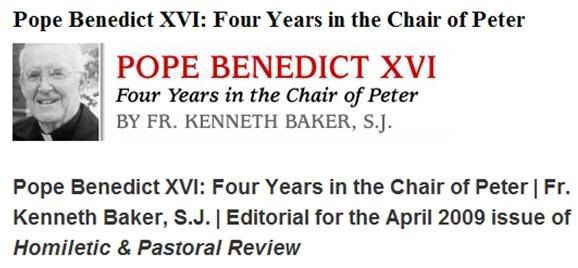
Last October I spent three weeks in Rome covering the synod on the Bible. During that time I was able to see Pope Benedict XVI at several events — Sunday Masses and Wednesday audiences in St. Peter’s Square.
In April he will be 82 and will complete four years as our Supreme Shepherd and Vicar of Christ on earth. In such a short time he has already had a tremendous impact on the Church.
In Rome he is very popular and attracts huge crowds to his weekly audiences. Germans, of course, are very much in evidence and seem to outnumber Italians at the audiences by two or three to one.
When he was elected pope and in his first audiences, he seemed a bit diffident and surprised that thousands of people would come to see him and cheer him. He soon got over that and now obviously enjoys blessing the huge crowds as he drives around St. Peter’s Square in the famous white “popemobile.”
Coming from Bavaria and being a professor, scholar and first-rate theologian, at first sight he would seem to be out of place as the head of the Roman Catholic Church.
Shortly after he was elected he went to visit his staff at the Congregation for the Doctrine of the Faith and told them he did not want to be the center of attention. But one of his friends told him, “Your Holiness, that cannot be since you are now the Vicar of Christ.”
Joseph Ratzinger is by nature rather shy. He is soft-spoken and kind to all. The best word I know of to characterize him is to say that he is a gentleman.
In the 1970s I attended two or three meetings in Germany at which he was present as Professor Ratzinger. At the time I was impressed by his kind and gentle manner in dealing with others and in speaking about them.
Benedict is an outstanding theologian. At the recent synod he spoke one day for about eight minutes on a topic concerning the Bible — the relationship between exegetes (that is, Scripture scholars who interpret and comment on the Bible) and theologians.
He cut right to the heart of the matter by saying that there are two dimensions to the written word of God: 1) the historical, which has to do with past events, and 2) the divine, which has to do with the inspiration and inerrancy of the Bible.
For too long, he said, exegetes have concentrated almost exclusively on the historical and human in the Bible and have neglected the divine, which has to do with theology. He said that the two areas of study must learn to work together and learn from each other.
One of the Pope’s main concerns is the liturgy of the Church. He has made significant changes in papal Masses, linking the liturgy to the tradition of the Church.
While I was in Rome the first volume of his Complete Works in sixteen volumes was made public. It contains his most important writings on the liturgy; it was his explicit wish that the first volume to be printed should be the one on the liturgy. The whole series will take eight years to produce — two volumes in German per year. Arrangements are being made to make the work available in other languages, including English.
Also, his motu proprio, Summorum Pontificum, which brought back the traditional Latin Mass as a regular part of Catholic worship, proves his concern about the tradition of the Church.
He has been saying for many years that there is no discontinuity between Vatican II and the previous history of the Church, that is, that Vatican II was not meant to be a whole new beginning for the Church and a rejection of the past.
Benedict XVI has reduced the papal schedule to a slower pace than that of his predecessor, John Paul II. He does not have guests at all his meals; he does not invite many concelebrants to his morning Mass; he does not travel as much as John Paul did.
He has changed the papal schedule in order to find time each day to study and write; since he loves classical music, he reserves a few minutes each day to play the piano.
He is now working on the second volume of Jesus of Nazareth —his outstanding life of Jesus Christ. They say in Rome that he is also working on a new encyclical. All of this takes time.
It is a difficult task for any man to be the Vicar of Christ. For his age, he seems very vigorous and does not walk like an old man. He is obviously a holy man — a priest who not only knows the Catholic faith thoroughly but also lives it.
He needs the prayers of the faithful, since he is our father in Christ. Please say a prayer for him after you have read this short essay.
—Kenneth Baker, S.J., Editor
|
 17/04/2009 16:01 17/04/2009 16:01 |
|
| | | OFFLINE | | Post: 17.147 | Registrato il: 28/08/2005
| Utente Gold | |
|
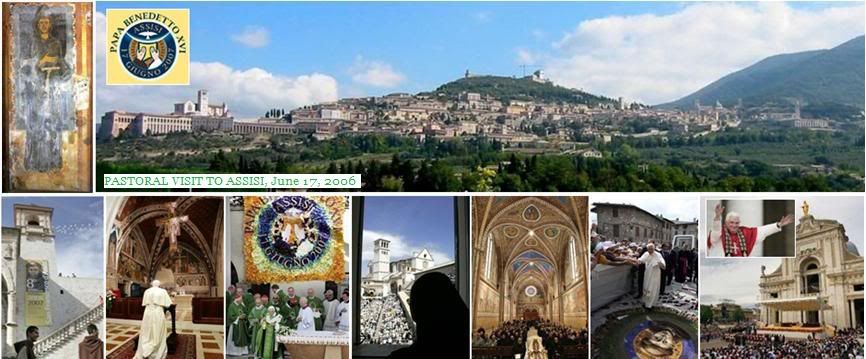 In advance of the Holy Father's meeting on Saturday with the superiors and representatives of the Franciscan order, John Thavis has this article:
For Pope Benedict, St. Francis offers
In advance of the Holy Father's meeting on Saturday with the superiors and representatives of the Franciscan order, John Thavis has this article:
For Pope Benedict, St. Francis offers
a conversion lesson for modern times
By John Thavis

VATICAN CITY, April 17 (CNS) -- At first glance, the scholarly Pope Benedict XVI -- sometimes dubbed "the Pope of reason" -- might seem an unlikely devotee of St. Francis of Assisi, the mystic friar of simple faith.
[Not to those who see and appreciate Joseph Ratzinger/Benedict XVI as, first and foremost, a Catholic priest of simple faith, who has always preached that the Christian faith is simple, and whose actual state of mysticism may be hidden to the world by his formidable powers of rational persuasion.]
Yet the German Pope has found in St. Francis something that goes beyond the saint's popular image as the patron of peace, the environment and animals. For him, St. Francis offers a model of radical conversion to Christ.
An earlier pontiff, Pope Innocent III, approved the founding of St. Francis's religious order 800 years ago, and in mid-April Franciscans from all over the world converged on the Italian hill town of Assisi to celebrate the anniversary.
Assisi has gained a reputation as a place for spiritual seekers of every stripe, and its inter-religious gatherings in recent years have drawn criticism from some conservative quarters of the Church.
Pope Benedict, however, has lauded the "spirit of Assisi" and its emphasis on dialogue and interfaith bridge-building. [Strange that Thavis does not see the need to qualify this with Cardinal Ratzinger-Benedict XVI's clear statements on what he means by 'spirit of Assisi', which is as dfferent from from the common usage of it has been as is the other much-touted 'spirit of Vatican II'.]
At the same time, he has encouraged Franciscans to highlight the fact that St. Francis' spiritual path began with a life-changing encounter with Christ. Today's pilgrims need to understand that connection, he said.
"It's not enough that they admire Francis: Through him they should be able to encounter Christ," the p\Pope said during a visit to Assisi in 2007.
It's instructive to see how Pope Benedict views the life of St. Francis. During the same visit, the Pope described the young Francis as a "king of partying" who grew disillusioned with the clothes, music and relatively easy life afforded him by his economic status in the 13th century.
In his first 25 years, the Pope said, Francis was mainly out for fun and entertainment in life. He was vain and placed a lot of emphasis on image.
The Pope's portrait of the young Francis was not a flattering one [because there was nothing flattering about the young Francis!]: a self-absorbed man who wandered the towns of central Italy looking for material pleasure.
Then a change came, as tradition recounts, triggered by small encounters with the poor and the sick.
The Pope compared Francis's conversion to that of St. Paul. Although Francis' journey was more gradual, he said, it was just as intense as St. Paul being knocked off his horse and blinded by the light of Christ.
Francis began to have visions and to withdraw in prayerful solitude. He told friends he was about to be married -- to a bride called "Lady Poverty." He encountered a leper on the road and, after first drawing away in disgust, went toward him and embraced him. He came to Rome, prayed at the tomb of St. Peter and gave away all his money.
His conversion is sometimes pinpointed to the moment when, praying before a crucifix, he heard God's voice telling him to "repair my house."
He then wandered the hills trying to rebuild churches, but this was far from an idyllic lifestyle: Francis was mocked as a madman, pelted with stones, locked up at times by his angry father and often went hungry and cold.
It was in 1208 that Francis clearly understood his vocation, while listening to the Gospel account of Christ's instructions to his disciples: to renounce all material things and to roam the land, calling people to penance and peace. He experienced these words of Scripture as a personal calling.
By now, ridicule among the local people was turning to respect, and Francis began to attract followers. He wrote the first "rule," a collection of Gospel principles on which his order would be founded; the exact form of that text is unknown today, but it was approved orally by Pope Innocent III in 1209 -- despite reported resistance by the Roman Curia to such a radical mode of religious life.
This year's commemoration in Assisi marks the approval of the first rule of St. Francis, and it will no doubt be followed by others in a kind of "rolling anniversary" of Franciscan milestones, including Francis' death in 1226.
He was canonized only two years after he died, and has become the patron saint of Italy, of the Italian lay movement Catholic Action, and many other groups, as well as of animals and the environment.
For Pope Benedict, St. Francis is relevant today not only because of his eco-friendly image. The key to his vocation was the figure of Christ, the Pope said, and if seen strictly through the lens of social activism the saint suffers a "type of mutilation."
That St. Francis suffered the stigmata -- the wounds of Christ -- was an eloquent sign of this, he said.
"He fell in love with Christ. The wounds of the crucified one wounded his heart before leaving their marks on his body on Mount La Verna. He could truly say with Paul: 'It is no longer I who live, but Christ who lives in me,'" the Pope said.
It wouldn't be surprising to see the figure of St. Francis appear in Pope Benedict's upcoming social encyclical, which is expected to treat the questions of charity and the Christian response to economic injustice.
As the Pope has said, St. Francis's radical rejection of material comfort was part of his "quest for Christ in the faces of the poor."
 The texts of Pope Benedict XVI's discourses during his pastoral visit to Assisi on June 17, 2006, along with much background information on St. Francis, may be found conveniently in the thread PASTORAL VISITS TO ITALY
freeforumzone.leonardo.it/discussione.aspx?idd=6675691&p=3
freeforumzone.leonardo.it/discussione.aspx?idd=6675691&p=4
Further, in a post-script to Sandro Magister's article, found on Page 4 of the PASTORAL VISITS thread, where he cites Benedict's references to botu St. Augustine and St. Francis as models of true conversion, I made this note:
The texts of Pope Benedict XVI's discourses during his pastoral visit to Assisi on June 17, 2006, along with much background information on St. Francis, may be found conveniently in the thread PASTORAL VISITS TO ITALY
freeforumzone.leonardo.it/discussione.aspx?idd=6675691&p=3
freeforumzone.leonardo.it/discussione.aspx?idd=6675691&p=4
Further, in a post-script to Sandro Magister's article, found on Page 4 of the PASTORAL VISITS thread, where he cites Benedict's references to botu St. Augustine and St. Francis as models of true conversion, I made this note:
The Pope devotes two pages in JESUS OF NAZARETH, pp. 78-79 in the English edition, to discussing Francis as 'the most intensely lived illustration' of the First Beatitude ("Blessed are the poor in spirit...") in the history of Faith.
He ends his discussion by saying: "It is above all by looking at Francis of Assisi that we see clearly what the words 'Kingdom of God' mean. Francis stood totally within the Church, and at the same time it is in figures such as he that the Church grows toward the goal that lies in the future, and yet is already present: The Kingdom of God is drawing near."
[Modificato da TERESA BENEDETTA 18/04/2009 12:45] |
 17/04/2009 17:52 17/04/2009 17:52 |
|
| | | OFFLINE | Post: 1.842 | Registrato il: 27/11/2005
| Utente Veteran | |
|
Teresa - Thank you for these recent and most enlightening articles.
I'd love to read the new children's book, preferably in English, as the Italian one "Joseph e Chico" was difficult. I'm sure you'll post here as soon as it's available in English. |
 18/04/2009 05:12 18/04/2009 05:12 |
|
| | | OFFLINE | | Post: 17.149 | Registrato il: 28/08/2005
| Utente Gold | |
|

 Pope's visit to quake victims
Pope's visit to quake victims
may not include Mass
Translated from

ROME, April 17 - Pope Benedict XVI's visit to the Abruzzo will be a short one and will very likely not include a Mass because this would involve problems of getting victims together into one place from their various temporary encampments.
It was learned that he would arrive by helicopter at the Finance Guard school near L'Aquila, where the funeral Mass for the earthquake dead was held on Good Friday.
There, he will meet with civil and religious authorities, and with volunteer worker representatives. He will then proceed to one of the tent cities to visit with those who are now homeless.
However, it is already being speculated that the Pope could return eventually to say the inaugural Mass at the Cathedral of L'Aquila after it is rebuilt.
All this, while the date for the first visit still has to be firmed up. May 1 appears to be the target date, even in the face of a threatened general strike by labor unions on that day (Labor Day).
May 6 has been mentioned as a possibility, being the first month anniversary of the earthquake, but it is too near the Pope's departure date for the Holy Land, so it is less likely.
A definite date will depend on the assessment by the Italian commissioner for the emergency, Guido Bertolano, who is aware that the Pope has publicly said he wishes to be able to visit L'Aquila 'as soon as possible'.
Bertolano has to determine when the conditions of security, safety [from possible aftershocks], and on-site convenience are appropriate for the Pope.
Sources at the archdiocesan Curia of L'Aquila said that a few weeks before the earthquake, the diocese was considering inviting Benedict XVI to visit L'Aquila in August 2010 for the closing of the Celestinian Year, marking the eighth centenary of the birth of Pope Celestine V, L'Aquila's most eminent citizen.
In the meantime, both the Italian Church and the Vatican have been very supportive of the earthquake victims. The Italian bishops' conference has given an initial donation of 5 million euros in aid, and has pledged collections at next Sunday's Masses all over Italy for the same purpose, in addition to collections taken up by various private organizations.
The Vatican immediately sent a squad from its fire department to help in initial rescue work after the first tremor. The Vatican Museums have offered to take temporary custody of all artworks recovered or rescued from the ruins of the many churches and historical edifices destroyed in the earthquake.
And on Maundy Thursday, the Pope consecrated sacramental oils and Chrism specially for the stricken diocese of L'Aquila and donated the chalice used at the funeral Mass as a token of his spiritual closeness to the victims.
Most of all, before Easter, the Pope sent a cash donation to the Archbishop of L'Aquila, Mons. Giuseppe Molinari, to be given to needy victims who need some money to tide them over the emergency until they can be resettled.
Don Claudio Tracanna, spokesman for the diocese, that a gesture that really meant very much to the diocese was the Pope sending his personal secretary, Mon. Georg Gaenswein, to represent him at the funeral Mass.
"It was something so completely novel," he said, "beyond any protocol. As was the personal message that the Pope sent for the Mass, which was read by his personal representative and not by the Secretary of State [who presided at the concelebrated Mass]."
He said that when Mons. Gaenswein was boarding the helicopter to return to Rome, he noticed that Bishop Molinari was not wearing a wristwatch, which he had lost during the earthquake. Whereupon, he took off his wristwatch and gave it to the Archbishop.
|
 18/04/2009 12:38 18/04/2009 12:38 |
|
| | | OFFLINE | | Post: 17.154 | Registrato il: 28/08/2005
| Utente Gold | |
|
 'The joy of meeting Jesus
'The joy of meeting Jesus
is at the center of
Benedict XVI's Magisterium'
Interview with Mons. Rino Fisichella
Translated from
the Italian service of

April 17, 2009
Yesterday, from all over the world, the greetings came for Benedict XVI on his 82nd birthday. From religious, political and civilian leaders, as well as from simple citizens.
There was a particular greeting from Mother Teresa's Missionaries of Charity in Orissa, India, who thanked the Pope for raising a prophetic voice against so much suffering and injustice in the world, as he has been doing for the past four years.
Indeed, the Pope will be marking the fourth anniversary of his election to the Papacy on Sunday, April 19.
But is there a special word we can associate with this event? Fabio Colagrande asked this of Archbishop Rino Fisichella, president of the Pontifical Academy of Life and rector of the Pontifical Lateran University.
MONS. FISICHELLA: I think the word is something normal and common in the language of the Holy Father himself - joy - which means that we can live these days and these moments in a fullness and fulfillment that is not merely a psychological state of mind.
The joy that the Pope speaks of is a Biblical joy, knowing that we are living a new moment in our life. It is a moment of change, of being oriented towards verifying the fulfillment of ancient promises: Christ is risen, we are called to announce Christ with our lives, and the Pope teaches this to us daily.
In your opinion, Excellency, after four years of his pontificate, what are the priorities of Benedict XVI's Magisterium?
We have come to a time similar to that of the Paschal Triduum when the Pope once more gave us his best reflections on sacred texts on the significance for every Christian of Thursday, Friday and Saturday in Holy Week, and Easter.
I think we all listened intensely to the teachings of the Pope in his Holy Week homilies: on Maundy Thursday, to all of us priests, and afterwards, he made us go over the fundamentals of the Passion of Christ and the joy of Resurrection, the significance of light as he explained to us at the Easter Vigil.
I think Benedict XVI is carrying out his fundamental task by giving us his own personal testimony, as an individual and as Pope - which is to touch first hand the great value and, above all, the actuality, of the Word of God: that God continues to speak to us today, he speaks to us constantly, and allows us to enter into the profundity of the mystery that he revealed to us.
It seems that the Pope also challenges the contemporary world, but a challenge that is rather inconvenient and difficult to accept...
But it has always been so, in the two thousand years of our history. When Jesus preached along the roads of Galilee, his message contained a great cultural challenge. And so it was for Paul when he encountered the Stoic philosophers in the Areopagus and told them about the Resurrection. When Justinus came to Rome to found the first Christian schools....and with Vatican II, which had the great challenge of trying to understand modernity.
And so it is with Benedict XVI who, with the cultural and intellectual lucidity that is characteristic of him, is trying to make us understand the great challenges that now face mankind at this stage of history.
Because the core of his Magisterium is this unity of faith and reason?
Because the problem of faith and reason is the ability to make it understood that the Christian event - unlike so many other religious expressions - is not a myth at all but a historical reality.
Reason can inquire, it can verify; reason - with all the instruments at its disposal - can make the great value of the Christian faith understandable.
And so the Pope constantly reiterates this dimension: Jesus is not a myth, Jesus is not a phantasm, Jesus is a concrete person, and as a concrete person, the Gospels, which give testimony of him, can be considered with all the instruments that reason has.
I would say they orchestrate a symphony that allow us to reach the fundamental nucleus of our faith, which is the encounter with Jesus.
[Modificato da TERESA BENEDETTA 18/04/2009 12:39] |
 18/04/2009 14:03 18/04/2009 14:03 |
|
| | | OFFLINE | | Post: 17.155 | Registrato il: 28/08/2005
| Utente Gold | |
|


April 18
Blessed James Oldo (Italy, 1364-1404)
Franciscan Tertiary
OR today.
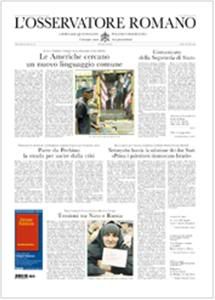
Page 1 features the unsigned communique issued yesterday by the Secretariat of State
reacting two weeks late to an offensive resolution against the Pope by the Belgian Parliament,
with references to related inside-page items (a statement of support from the bishops of
French-speaking West Africa and an editorial commentary, 'Beyond prejudice'(translated
two posts above). Other Page 1 stories: The summit of the Americas in Trinidad-Tobago
this weekend; Israeli Prime Minister Netanyahu tells US special envoy that a two-state solution
was out of the question if the Palestinians don't even recognize Israel; and supposed
signs of recovery in China's economy indicate Beijing may lead the way out of the global
crisis [OR has been increasingly quick with its snap judgments on world events lately!].
The inside pages include a story about the significance of the Holy Father's coming
pilgrimage to the Holy Land in Catholic relations with the Jews; the Easter message of
the Patriarch of Constantinople, Bartholomew I, as the Orthodox world celebrates Easter
tomorrow; and a story on the head of the Orthodox Church in the United States rejecting
the 'leadership' of Constantinople and declaring itself autocephalous and aligned with
the Patriarchate of Moscow.
THE POPE'S DAY
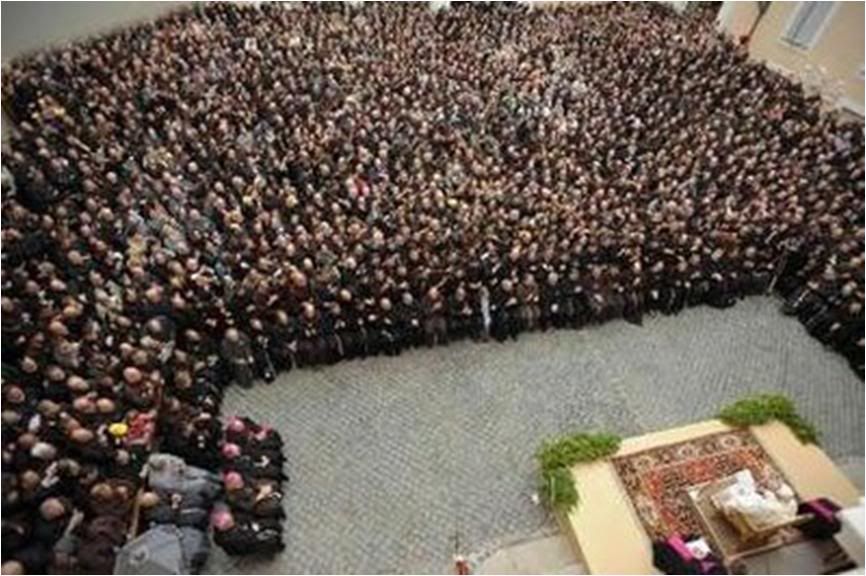 Special audience with the Franciscan family
Special audience with the Franciscan family - The Holy Father today met with participants
in the order's 'Chapter of Mats', an international meeting to commemorate the 800th anniversary
of the order. Address in Italian.
POPE'S VISIT TO QUAKE VICTIMS
SET FOR APRIL 28
Translated from

Fr. Federico Lombardi, Vatican press director, made this announcement today:
On Tuesday, April 28, Pope Benedict XVI will visit Abruzzo to meet with the victims of the recent earthquake as he expressed earlier.
he will first visit the tent city at Onna, where he will arrive at 9:30 a.m. and then proceed to L'Aquila where he will make stops at the House of Students and the Basilica of Collemaggio [both ruined in the earthquake].
Finally, he will meet with representatives of the population as well as those in charge of rescue and aid services at the barracks of the Finance Guard [where the funeral Mass for the victims was held on Good Friday]. He will return to Rome by 12:30.
During his helicopter tour, the Pope will be flown over some of the areas most hard-hit by the earthquake.
POPE NAMES POLISH BISHOP
TO HEAD PONTIFICAL 'HEALTH MINISTRY'
The Vatican also announced today that the Holy Father has accepted thE resignation of Cardinal Javier Lozano Barragan as President of the Pontifical Council for Ministry to Health Care Workers, after having reached canonical retirement age.
The Pope named Mons. Zygmunt Zimowski, Archbishop of Radom (Poland), as his successor, elevating him at the same time to the rank of Archbishop.
Mons. Zimowski, born in 1949, is a theologian who worked with Cardinal Joseph Ratzinger at the Congregation for the Doctrine of the Faith and participated in the preparation of the Catechism of the Catholic Church. John Paul II named him Bishop of Radom in 2002. Cardinal Ratzinger travelled to Radom at the time to consecrate him as bishop.
 Just to make up for the lack of papal pictures in today's OR, here's an Easter Sunday picture
Just to make up for the lack of papal pictures in today's OR, here's an Easter Sunday picture
to remind anyone who needs reminding - no Benaddict, surely - that tomorrow, we celebrate
four full years of Benedict XVI as our Holy Father. DEO GRATIAS!
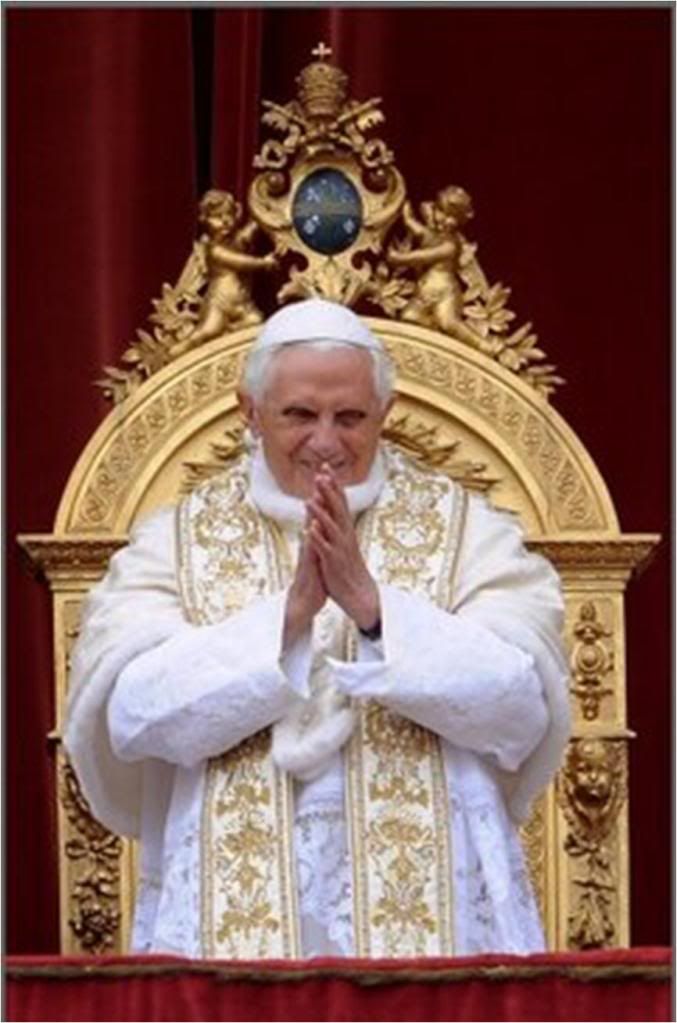
[Modificato da TERESA BENEDETTA 18/04/2009 15:17] |
 18/04/2009 15:13 18/04/2009 15:13 |
|
| | | OFFLINE | | Post: 17.155 | Registrato il: 28/08/2005
| Utente Gold | |
|
 Another 'mood-setting' piece for tomorrow's anniversary is cited today by a Catholic group blog called The Black Cordelias, from a blog item last year, April 17, 2008, during the Pope's visit to the United States, by a conservative blogger, Lee Rockwell.
Another 'mood-setting' piece for tomorrow's anniversary is cited today by a Catholic group blog called The Black Cordelias, from a blog item last year, April 17, 2008, during the Pope's visit to the United States, by a conservative blogger, Lee Rockwell.
It is an assertion of one aspect of Catholic identity that even we Catholics do not often argue enough. Another blogger who quoted this item titled his post PETER, ROCK OF AGES, which is really the better title.
POPE AND PRESIDENT

April 17, 2008
Need I mention that the Catholic Church long antedated the US government, and there will be a Pope long after there is no US President? I am inspired, of course, by the comment of the great 19th century classical-liberal (and Protestant) historian, Thomas Babington Macaulay.
There is not, and there never was on this earth, a work of human policy so well deserving of examination as the Roman Catholic Church.
The history of that Church joins together the two great ages of human civilisation. No other institution is left standing which carries the mind back to the times when the smoke of sacrifice rose from the Pantheon, and when camelopards and tigers bounded in the Flavian amphitheatre.
The proudest royal houses are but of yesterday, when compared with the line of the Supreme Pontiffs. That line we trace back in an unbroken series, from the Pope who crowned Napoleon in the nineteenth century to the Pope who crowned Pepin in the eighth; and far beyond the time of Pepin the august dynasty extends, till it is lost in the twilight of fable.
The republic of Venice came next in antiquity. But the republic of Venice was modern when compared with the Papacy; and the republic of Venice is gone, and the Papacy remains.
The Papacy remains, not in decay, not a mere antique, but full of life and youthful vigour. The Catholic Church is still sending forth to the farthest ends of the world missionaries as zealous as those who landed in Kent with Augustin, and still confronting hostile kings with the same spirit with which she confronted Attila.
The number of her children is greater than in any former age. Her acquisitions in the New World have more than compensated for what she has lost in the Old.
Her spiritual ascendency extends over the vast countries which lie between the plains of the Missouri and Cape Horn, countries which a century hence, may not improbably contain a population as large as that which now inhabits Europe. The members of her communion are certainly not fewer than a hundred and fifty millions; and it will be difficult to show that all other Christian sects united amount to a hundred and twenty millions. [This was written in the 1800s].
Nor do we see any sign which indicates that the term of her long dominion is approaching. She saw the commencement of all the governments and of all the ecclesiastical establishments that now exist in the world; and we feel no assurance that she is not destined to see the end of them all.
She was great and respected before the Saxon had set foot on Britain, before the Frank had passed the Rhine, when Grecian eloquence still flourished at Antioch, when idols were still worshipped in the temple of Mecca.
And she may still exist in undiminished vigour when some traveller from New Zealand shall, in the midst of a vast solitude, take his stand on a broken arch of London Bridge to sketch the ruins of St. Paul's.
[Modificato da TERESA BENEDETTA 18/04/2009 16:17] |
 18/04/2009 16:25 18/04/2009 16:25 |
|
| | | OFFLINE | | Post: 17.158 | Registrato il: 28/08/2005
| Utente Gold | |
|
 Some belated birthday news!
Muslims, Buddhists, Hindus of Bangladesh:
Some belated birthday news!
Muslims, Buddhists, Hindus of Bangladesh:
'We need the Pope's voice of truth'
by William Gomes

Dhaka, April 18 (AsiaNews) - "We want to see the Pope in our midst, we will be blessed to see him in Bangladesh, his presence will bring peace and happiness to the nation, I wish and pray his long life.”
This is the wish that the venerable Dhirbangsha Bikkhu, a Buddhist monk of the international monastery in Dhaka, has sent to Benedict XVI on the occasion of his 82nd birthday.
In Europe, the direct attacks on the Pope continue, not least among them the official protest presented to the Holy See by the Belgian Parliament, because of "the unacceptable stance taken by the Pope on the occasion of his trip to Africa."
But the messages coming from Bangladesh, which has an overwhelming Muslim majority population (more than 88% of the 144 million inhabitants), instead express respect and closeness to the Pope.
The venerable Dhirbangsha Bikkhu tells AsiaNews that "Benedict XVI is the father of peace, he works for peace and a religion of peace."
Together with the wishes from the Buddhist monk, there are others from Muslims like Ubaidur Rahman Khan Nadwi, assistant editor of the newspaper Daily Inqilab: "We appreciate his firm work for inter-religious peace and harmony. We especially appreciate his deep concern over states declaring war, propagating evil policies and oppressing the Muslims. We need his voice of truth and peace. We pray for his long life."
Among the Hindus as well, there is no lack of those who have taken Benedict XVI's birthday as an opportunity to express their closeness to him.
B K Sreekanto of the Brahma Kumari Institute in Daka recalls that "the Pope is holy, and wherever he will go in the world he will bring success. He works for the well-being of the people. We pray for his long life and ministry."
In addition to the various religions of Bangladesh, birthday greetings have also been expressed by the small Catholic community in the country, 1.1% of the population.
Msgr. Kurian Matthew Vayalunkal of the Holy See embassy in Bangladesh explains that the faithful are preparing to celebrate the anniversary of Benedict XVI's election, which will be commemorated by Catholics all over the country on Sunday, April 19.
|
 18/04/2009 17:51 18/04/2009 17:51 |
|
| | | OFFLINE | | Post: 17.159 | Registrato il: 28/08/2005
| Utente Gold | |
|
 Those boys who spontaneously counter-demonstrated against leftists protesting the Pope's statements on condoms and AIDS in front of Paris's Notre Dame Catehdral last March 22 have gone on to formalize their movement TOUCHE PAS A MON PAPE! (Do not touch my Pope!)
Those boys who spontaneously counter-demonstrated against leftists protesting the Pope's statements on condoms and AIDS in front of Paris's Notre Dame Catehdral last March 22 have gone on to formalize their movement TOUCHE PAS A MON PAPE! (Do not touch my Pope!)
And here's what they plan for tomorrow - a BENOITHON [pronounced Ben-wa-ton - with this translation of their online announcement]:
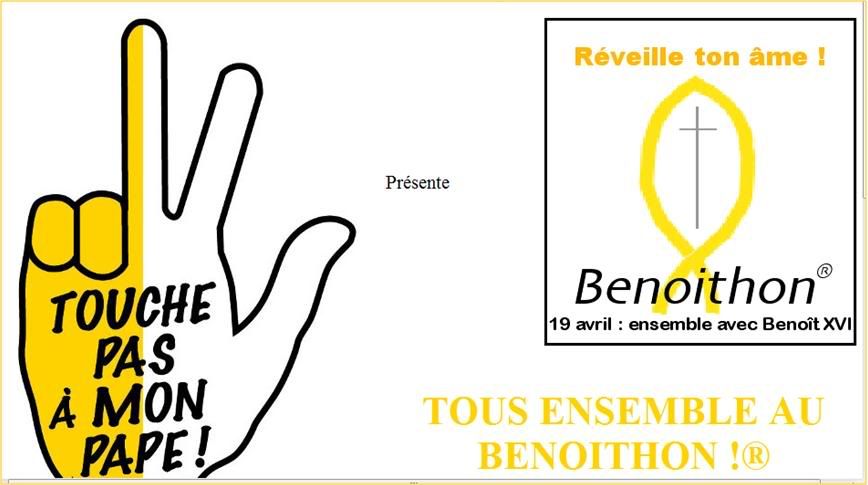
This Sunday, April 19, Feast of Divine Mercy, come celebrate with us the fourth anniversary of Benedict XVI's Pontificate and his 82nd birthday, by taking part in thE first BENOITHON®!:
fr-fr.facebook.com/event.php?eid=60904584751
Several Thanksgiving Masses will be offered throughout the day.
Starting at 19:30, come in numbers, with your families, in all calors, and bring cakes and drinks to celebrate around a 'Pot of Hope' in front of Notre Dame, in the joy of celebraitng, after John Paul II, a Pope as brilliant and as humble as Benedict XVI!
On this occasion, we will launch a collection drive for the first international NGO [UN-speak for non-governmental organization] that has been successfully fighting AIDS - the Catholic Church - through organizations like
dream.santegidio.org/x__homep.asp?Curlang=FR
The tagline on the BENOITHON logo says "Wake up your soul!" and "April 19: Together with Benedict XVI".
|
|
|
|
|